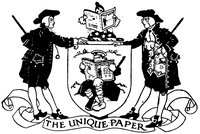
Title: The First Book of Eve
Illustrator: Anne Harriet Fish
Author: Fowl
Author of introduction, etc.: Richard King
Release date: October 2, 2019 [eBook #60404]
Most recently updated: October 17, 2024
Language: English
Credits: Produced by Richard Tonsing, ellinora, and the Online
Distributed Proofreading Team at http://www.pgdp.net (This
file was produced from images generously made available
by The Internet Archive/American Libraries.)
Transcriber’s Note:
The cover image was created by the transcriber and is placed in the public domain.


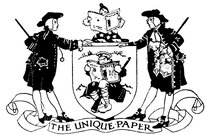
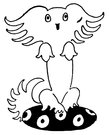
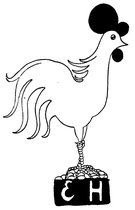

Dear boys,
I am dedicating my first little book to you because you have written and told me so often from the North Sea, from “Somewhere in France,” from Africa, and Mesopotamia that my queer sketches have brightened for you some dull or gloomy hours. Bless you! for if that is true, why then I feel that even your frivolous Eve has done her “bit” in this terrible heartrending struggle. And you will understand, dear boys, that I have—notwithstanding Aunt Matilda’s and Uncle Fred’s disapproval—kept gay and frivolous to please you, and not because I didn’t understand and appreciate what you were doing for me, and other little Eves, and above all for our dear old country, which you have saved. Bless you all again and again. That all you wish may come to you as freely and as welcome as your generous appreciation has come to me is the constant wish of—
P.S.—Tou-Tou sends a fond lick.
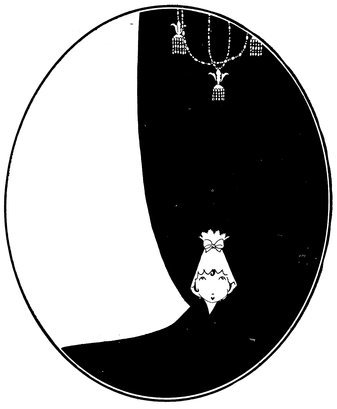
It is not often that an artist evolves a new type—more especially a new comic type. But this is the proud achievement of the artist whose work adorns this little book. “Eve” has now become a clearly recognised figure of modern life, as clearly recognised as are the figures of George Belcher, Dana Gibson, and Bateman, and that very small band of clever artists who have characteristics peculiar to themselves.
Few artists, however, have more quickly sprung into world-wide popularity than “Eve.” How great this popularity is may be judged by the numerous imitators which, while they copy many of Eve’s mannerisms, lose all that humour and spirit which make of Eve’s art such a fascinating and irresistible thing. For Eve possesses a gift which cannot be imitated, no matter how clever the artist who imitates her may be. Each person’s sense of humour—or lack of it—belongs to them alone. And it is Eve’s humour which make her delightful drawings so appealing. She has that sense of the “absurd” which is one of the rarest senses in all black-and-white art. And yet, while her irresistible humour makes one laugh, while her drawings fascinate us by their quaintness, she is never so far removed from reality as to be merely a painter of the human grotesque. Therein lies so much of her genius. She paints humanity with the eye of one who can see the comic in everyday people and things, and yet she never lets her feeling for the ridiculous obliterate her feeling for Truth. It is to be regretted that the clever letters which these drawings originally illustrated in “The Tatler” cannot be reproduced on account of their topicality.
But in judging these fascinating drawings merely from the point of view of their humour and charm, one is apt to overlook the fact that Eve—while possessing a style which is unique—is also, and at the same time, a designer of remarkable gifts. It is, perhaps, as a designer that she will appeal most greatly to an artist. Each of her drawings is an exquisite example of this gift for design. Their line, their “proportion,” as it were, and the clever use she makes of black—big splashes of black—all help to make her drawings exquisite little pictures—“pictures” in the popular sense—as well as wonderful examples of technique and imagination. Another thing about all her drawings is their feminine daintiness. Each design is as dainty as the heroine who appears in nearly all of them. With a few strokes, a dot here and there, a line, she can suddenly bring before our eyes a perfectly-recognisable type. In this way her gifts are superior even to Phil May, who surely, more than many artists, obtained his effects with the least number of unessentials.
Moreover, Eve never draws what I must call a “dead” figure. Everyone—everything, almost—is alive. Her animals—burlesques of animals though they be—are full of character and fun. Even such things as motor-cars, ships, and carriages—which, from the point of view of an artist painting nothing but the truth, are out of all proportion—possess a quaintness which somehow accords better with the picture than if they were perfect models of technical knowledge and drawing.
Eve gives a comic twist to men and women of this world, but in that comic “twist” we seem to see and know them better, and to know them better is to love them more. That is one of the reasons, perhaps, why these fascinating drawings are so popular and so adored.
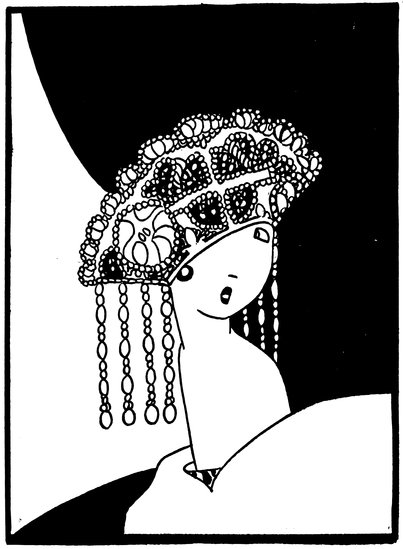
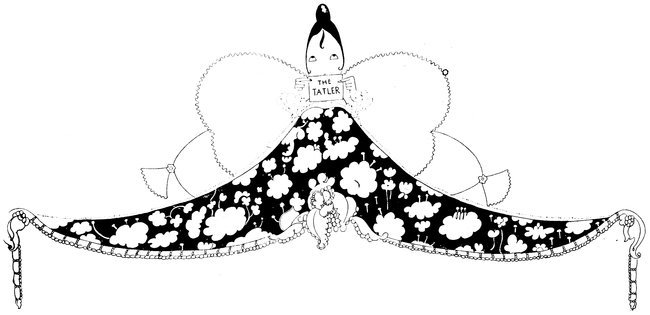
Being an irresponsible record of some incidents in the career of a frivolous little lady—to say nothing of Adam, Aunt Matilda, Uncle Fred, and Tou-Tou.
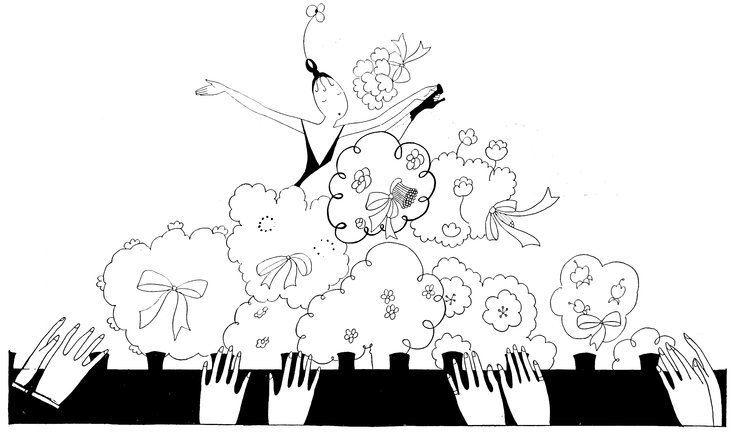
The successful invasion of the London stage by American artistes induces Eve to abandon her habitual reserve and appear (for charity) in a revue especially written for her by Sir Peter Pan. In order to avoid shocking the susceptibilities of the “past smart set,” who are these war times very early-Victorian, she has depicted herself at the moment when her scarcity of costume was obliterated by the mass of floral tributes hurled by an enraptured audience
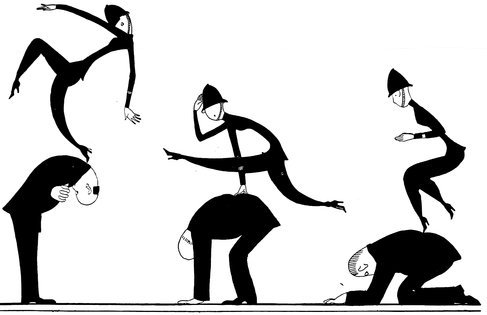
Eve, Evelyn, and Evelinda rising to the occasion by forming a posse of police. With the aid of Uncle Fred they practise the necessary gymnastics to fit them for the force with such success that—
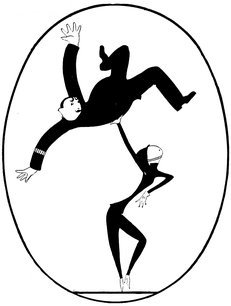
—they are able to astonish and convince a real copper as to their suitability for action
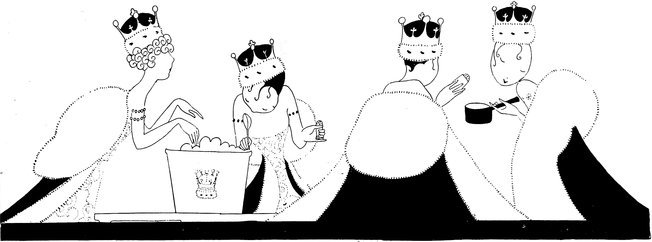
Servant Susie’s making shells for soldiers, so a splendid example is set to the ordinary citizeness by the titled rich, who are busy taking cookery lessons. It is, indeed, right that we stay-at-home men should in our trenchers share the dangers of our active brothers in their trenches
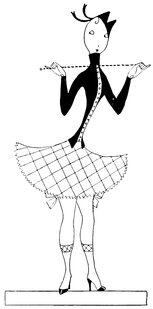
A daily paper says, “You can always tell when a girl has a young man at the front by the regimental badge she wears.” Eve likes the idea, and being at the moment enraptured with a Highland laddie determines that the world shall know it
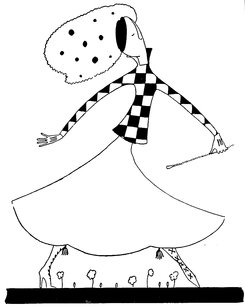
Those people who were wont to think the tight skirt unwomanly are hoping that the full skirt will bring back the modesty of the Victorian era. Eve hopes so, too; here she is in the new spotted veil cultivating a demure expression
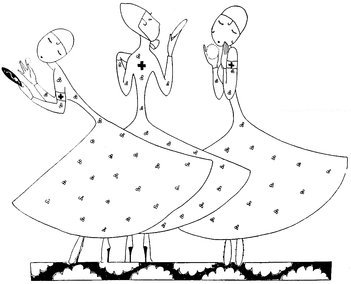
Eve and her sisters, Evelyn and Evelinda, tired of enforced inactivity, decide to do their bit at the front—or near it, and are here seen making their preparations for departure
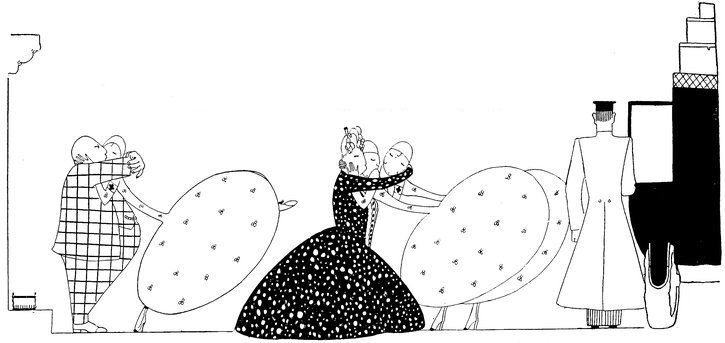
Here we have the wet and warm farewells on the parental doorstep. We have sternly pointed out to Eve that her costume is not the regulation one for the nursing sisterhood; but, as Eve says, all that matters is to look nice and be nice

When Eve, Evelyn, and Evelinda arrived at their destination they were promptly set to work scrubbing the floors and washing the dishes, while less ornamental but considerably more useful workers attended to the dear soldiers. Eve, Evelyn, and Evelinda, if disappointed, were full of patriotism, so they worked—and worked—
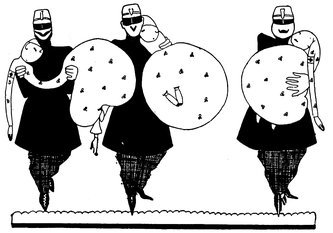
Till the authorities, in pure compassion, assisted our tired little friends back home—
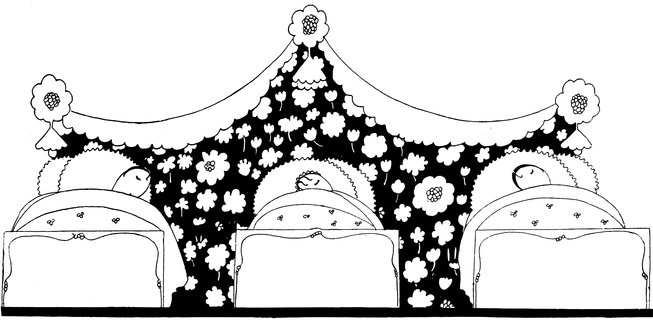
Where, with the blissful consciousness of duty done, may still be found wrapped in dreamless slumber Eve, Evelyn, and Evelinda
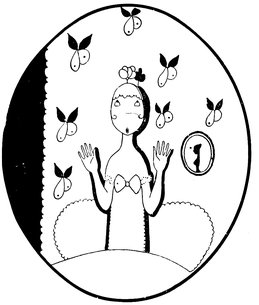
Eve goes down to the east coast for a rest cure. The first night she heard a bang and woke with a start and a cry of “Oh, dear! Oh, dear!”
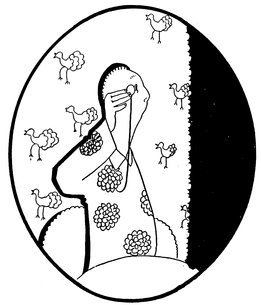
Uncle Fred, her kind and genial host, also awoke with a start and a cry of “—— ——” (censored). “It’s those —— Zeppelins,” he said
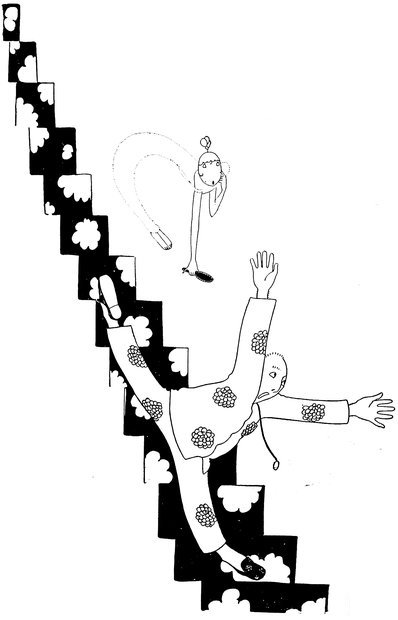
It was Zeppelins, and Eve and uncle came down three flights of stairs like shells from a gun, while, as for poisonous gas—well, you should have heard Uncle Fred!
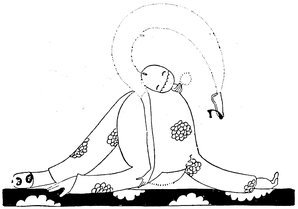
—I repeat, you should have heard Uncle Fred when he landed with Eve on the top of him. It was the finest hymn of hate ever heard on the east coast
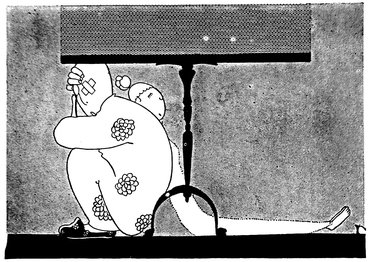
Anyway, here are Eve and uncle entrenched under the dining-room table. Eve is saying, “Are your teeth chattering, dear?” which is annoying uncle, for, as Eve well knows, they are up in the glass on his dressing-table
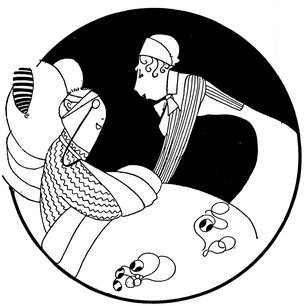
Soon the Zeppelins passed away, and uncle, who had suffered severely down the stairs, made a slow but comfortable recovery
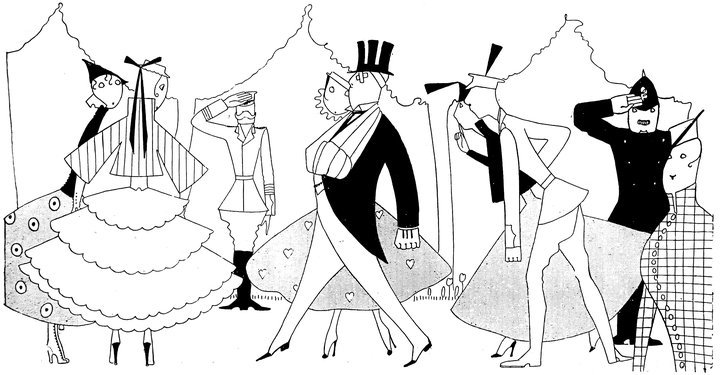
—And is now having the time of his life in London, where admiring crowds of both sexes take him for a wounded hero straight from the front. Uncle Fred is himself beginning to believe he has been there
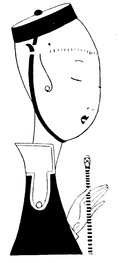
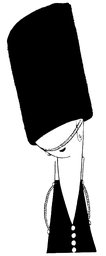
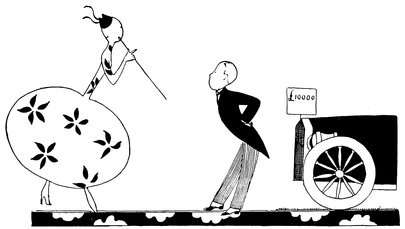
Eve, deciding that pedestrianism in these days of lady-driven cars is too dangerous and exciting a pursuit, determines to get a runabout of her own. Regard her then endeavouring to fascinate one of the typical little nuts which in those days adorned a fashionable garage
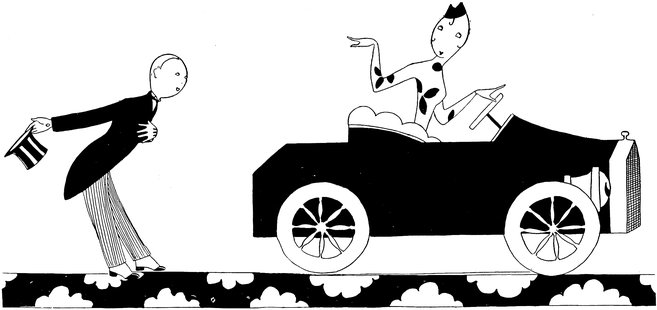
The car being chosen and the preliminary instructions having been obtained, Eve, full of pride and rapture, bids farewell to her little friend and sets forth to astound and arouse the envy of her dearest friends in the park
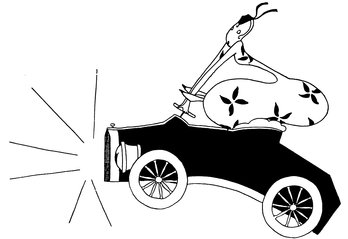
Astound them she certainly did—not the less because of the regularity with which she mistakenly pressed down the accelerator instead of the brake. Here we see her during one of the forward leaps consequent on the error
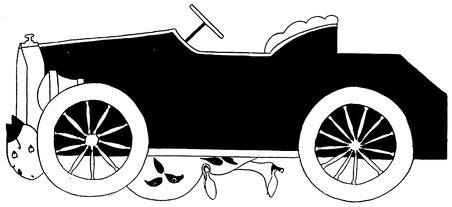
No mechanism, any more than any man, was ever built to resist Eve’s unexpected little ways, with the result that she, although assured as to the astonishment of her friends, is less certain as to the envy she aroused. (In case of any misunderstanding, we may add that the picture is supposed to represent Eve trying to repair her car in the most crowded and fashionable spot in the park)

However, all troubles come eventually to an end, and Adam, poor dear, just back from the trenches, learns at last what real fear means. The fat rolling lines at the bottom of the picture are supposed to represent the dust which kindly Nature raised to hide the casualties in Eve’s wake, but in reality they were put in to hide Eve’s weakness in drawing car wheels
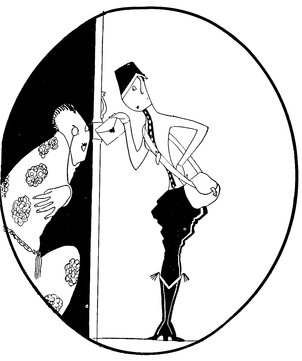
The shortage in postmen grows apace. Eve, as ever, steps into the breach, and you can imagine the unadulterated joy of one of her admirers who, unshorn and untidy, opens the door of his flat to receive from her a pink and scented missive
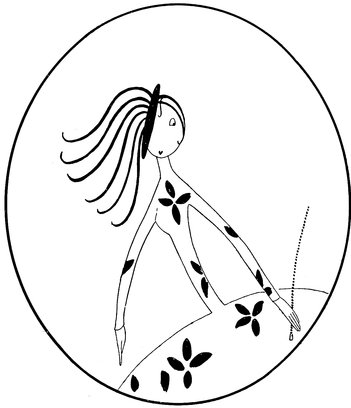
She signalises Italy’s splendid entry into the field of hostilities on the side of the Allies by adopting the famous Bersaglieri headgear
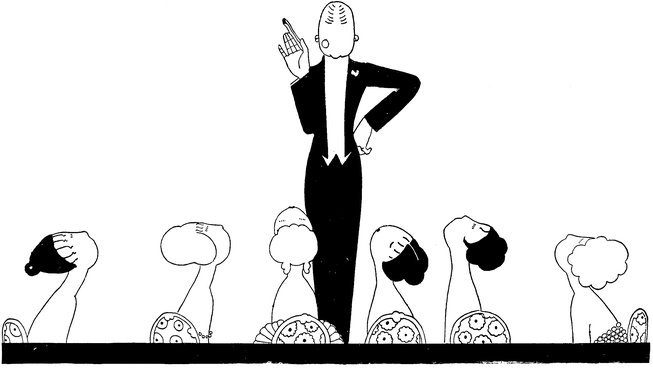
War economy proceeds apace, and Eve shows us that since brandy balls and “sich like” have taken the place of the tiny liqueur, society, straining after simplicity and innocence, has adopted a popular game reminiscent of our childhood. Adam, lucky man, drops the sweet, which the expectant fair catch in their tiny mouths
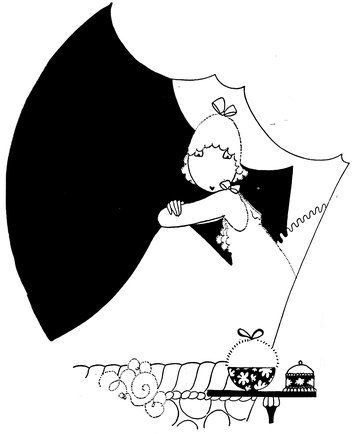
Study of Eve pondering deeply as to how she can help, these critical times. (We don’t wear sleeves on our nighties nowadays—for economy’s sake)
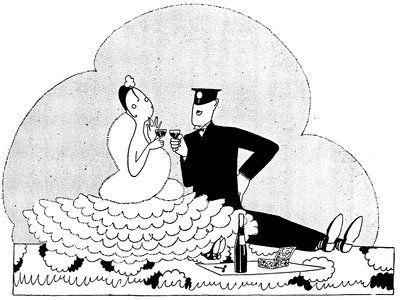
The merit of the poor “special” who guards gasworks and bridges is, in Eve’s opinion, sadly overlooked. A few little charming al fresco suppers to a few special “specials” is a duty she delights in
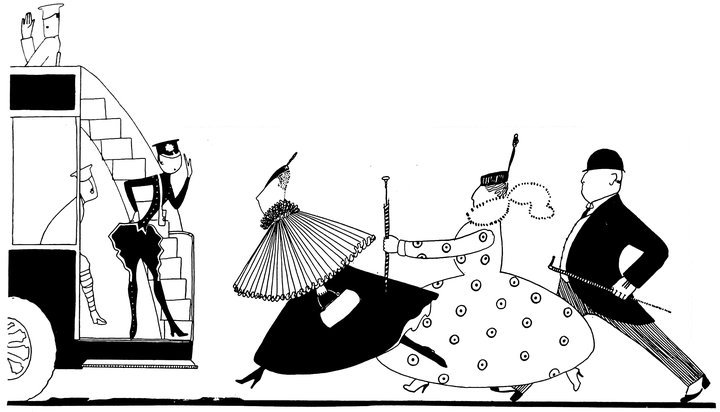
Eves are not only driving ’buses, but also conducting them these war times. Our picture represents the old brigade of ’bus riders helplessly imploring our heroine to stop and pick them up. Eve, however, having landed a few khaki heroes, is forsaking the regular route to take them for a little joy-ride to Richmond Park
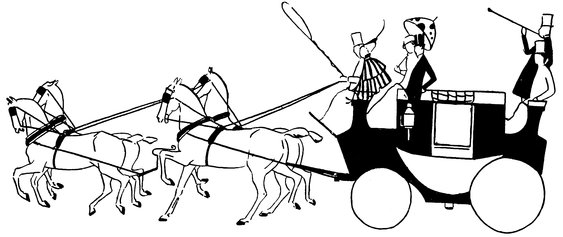
Alas! the Coaching Clubs’ fascinating meets are a thing of the past
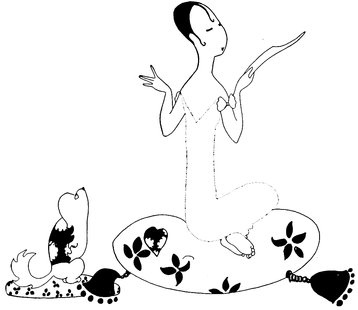
Eve draws up a list of things to do if the Zeps do come. She is seen reading it to Tou-Tou, who is visibly impressed
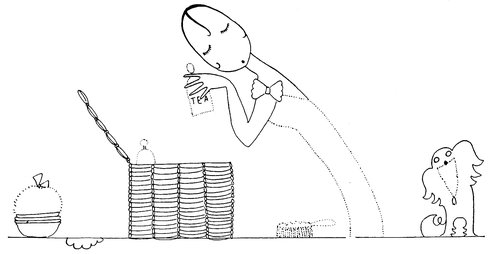
She carefully packs her hamper every night in case she may have to pic-nic out among the débris of her home the next day. Tou-Tou, as you see, is wearing his respirator
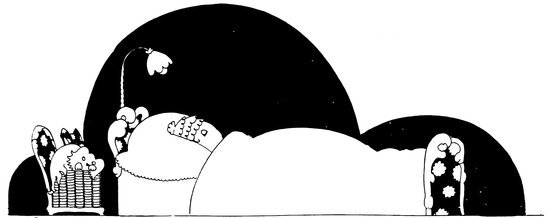
Here we have a vivid picture of Eve, hamper packed and ready (Tou-Tou on guard), keeping one eye open for the alarm. A considerable clamour awakens her, so—
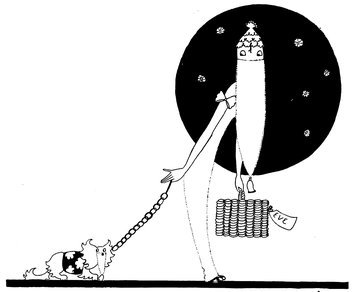
—she arises fixes her respirator, and prepares to descend to the darkness of the cellars—
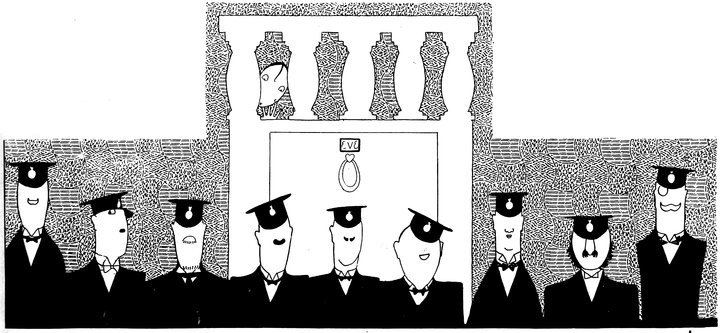
—only to find the disturbance was caused by a cordon of those gallant fellows, the “Extry-Spechuls,” who are visibly determined to guard her from all possible calamity
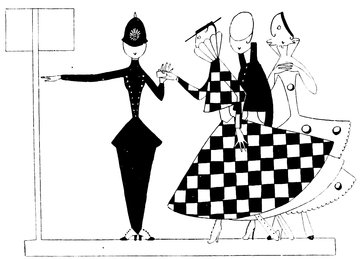
Patriotic women are energetically undertaking the work of Adams engaged in military duties. Eve desires to form a corps to supplement “the Methusiliers” or “the Last Gaspers” in case of invasion. Here is Eve being sworn in—a new experience, though, thanks to Uncle Fred, she is used to being sworn at
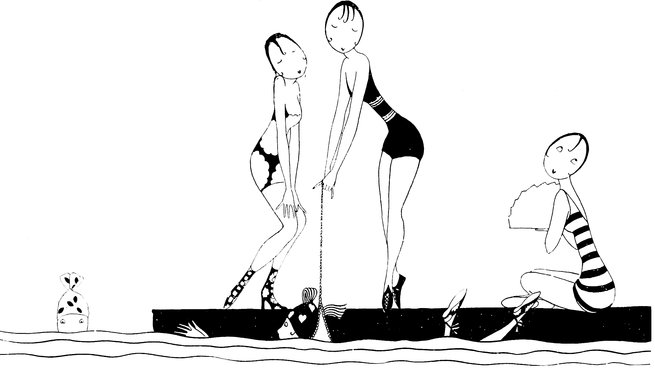
This is not the frivolous picture it appears, but represents little Eves in training for E.C.D.C. (Eve’s Coastal Defence Corps). Of course, the first thing to do is to learn to swim. Eve cannot tell us where this is taking place, as it would give away the (amatory) disposition of the Grand Fleet, which anchored dangerously close in soon after operations commenced
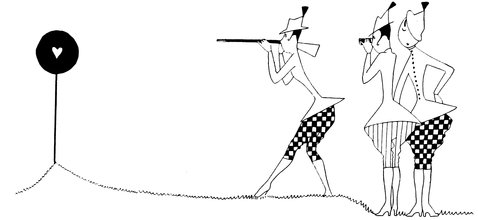
They found firing practice a little trying and dangerous, although the method of holding the rifle as demonstrated by our artist certainly mitigates the unpleasantness of the kick back
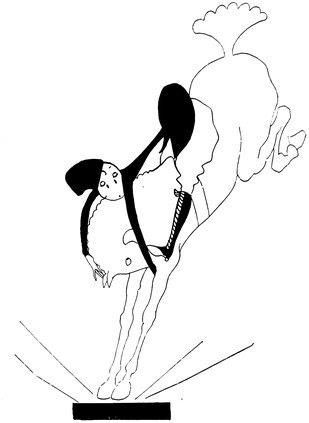
The cavalry section also had their difficulties
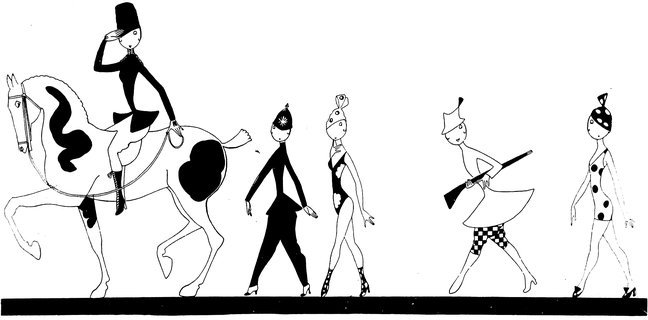
But the grand finale of the procession of the various units of the corps through London was an immediate success. The immense concourse of young men which followed in its wake were all inveigled into the recruiting office, a result which of course justified to the full the existence of the corps
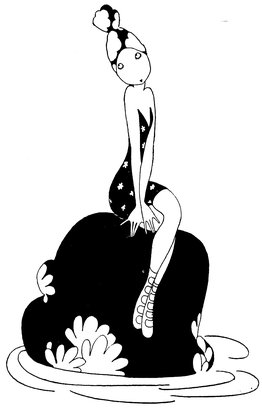
Eve, overcome by her war energies in London, returns to the east coast, where we find her enjoying a peaceful dip far, as one would think, from war’s alarms. But—
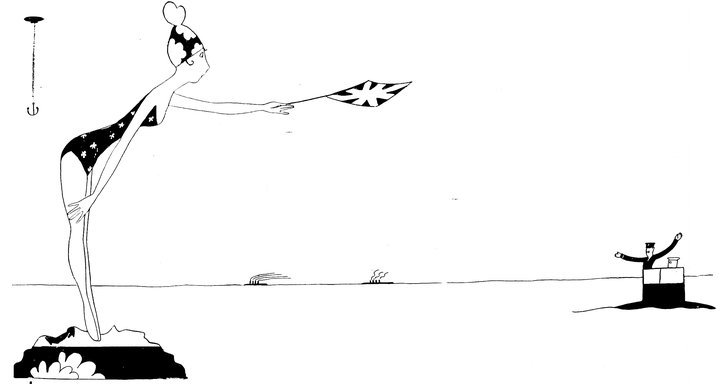
—suddenly she sees one of England’s gallant submarines appearing to investigate her presence. Her intense interest in its approach blinds her to the fact of an inimical gas-bag approaching with the evident intention of making the important capture of our little friend with the grappling iron
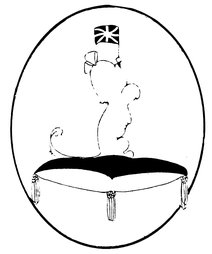
This is just Tou-Tou in Imperial mood (it has nothing to do with the submarine story, but fills an awkward blank.—Eve)

The bold and wicked air-pirates grappled Eve as planned, but (hooray for the Navy!) the gallant officer on the conning tower was able to seize her shapely limbs as she drifted over him, and, with the help of his equally gallant crew, effected a rescue at the expense of Eve’s already diminutive bathing creation—

—and, warm and happy, Eve is conveyed back to land at the slowest possible speed
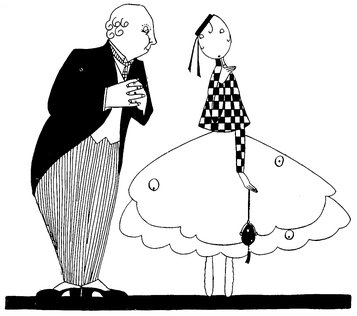
Eve, patriotically wishful to release an able-bodied Adam for active service, applies for and obtains a situation as clerk in the office of a susceptible merchant—
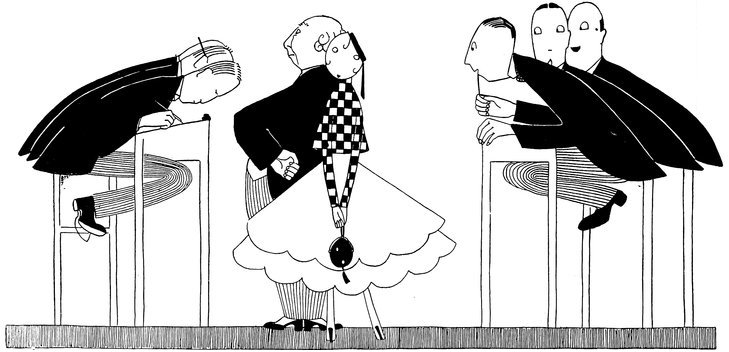
—who in due course introduces her to his staff, who are no less pleasantly affected by our charming little friend than their stern and businesslike employer
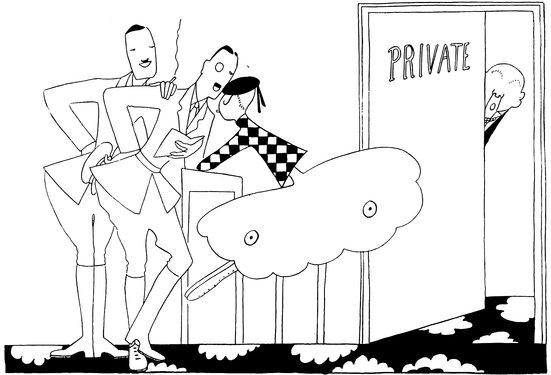
The constant flow of Eve’s khaki-clad friends, perennially anxious as to her progress, causes the first rift in the lute between her employer and herself—
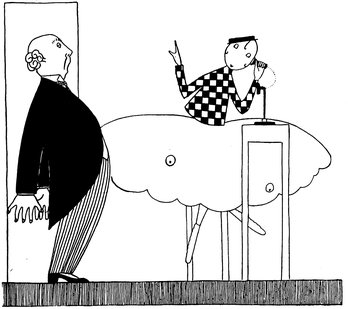
—which is distinctly widened by the monopoly she gradually obtains over the telephone for social purposes
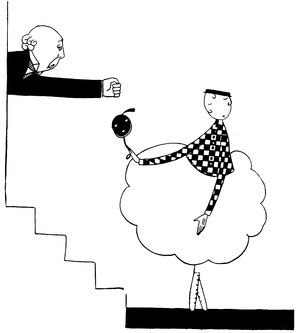
Finally, every clerk being prostrate with heart weakness, and the clerical work in the office at a standstill, Eve’s business career is cut short by her unappreciative master. By a careless swing of the purse Eve is endeavouring to show you her extreme nonchalance in a difficult situation
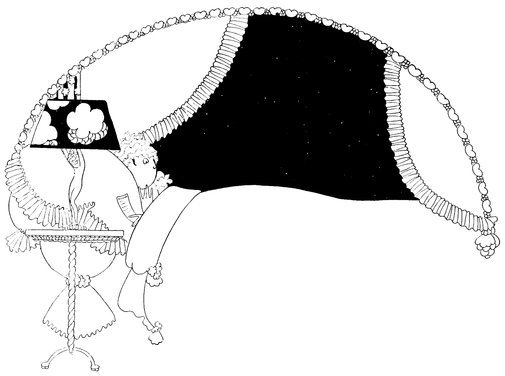
Eve has spent many sleepless nights brooding over her accumulated bills. You see, at the beginning of war time you will remember she developed—with ease and rapidity—an activity of shopping under the discredited banner of “Business as Usual”
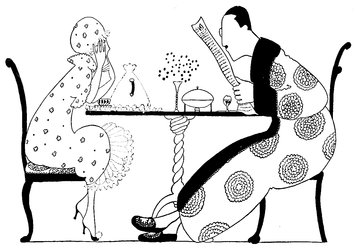
The chill ferocity with which Adam received her “little” accounts has filled her with fear and trepidation. Her very independence was threatened—
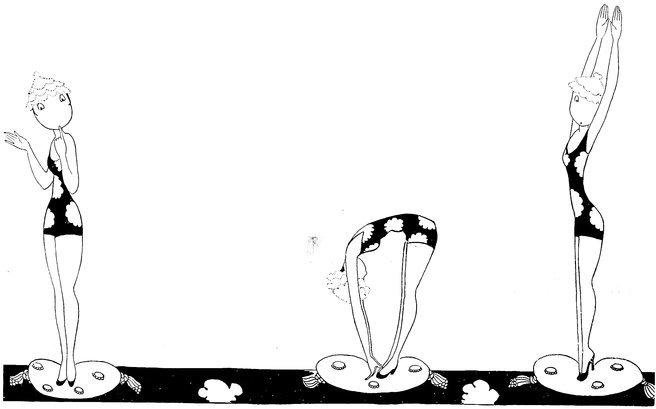
—when an idea struck her— —and every morning she did her exercises with a fervid gusto—
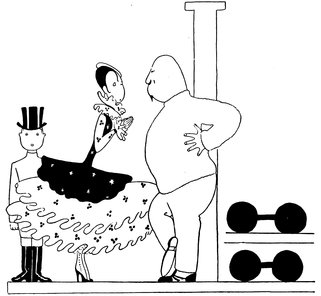
—and by regular attendance at one of the fashionable gymnasiums, attained a surprising degree of activity and strength—
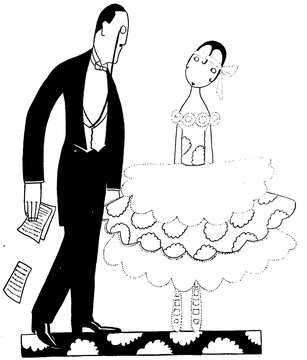
—The next time Adam gets the bills and commences his “hymn of hate”—
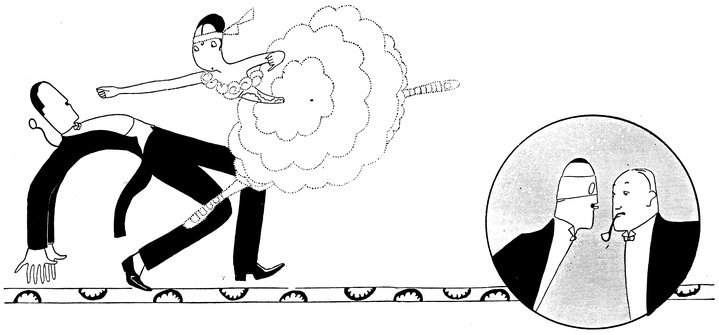
—she ups and biffs him one in the eye, with surprisingly successful results. What is left of Adam may be seen in the picture on the right. He is now longing for conscription
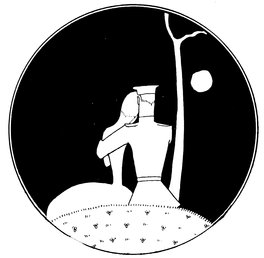
Do not misunderstand this picture—
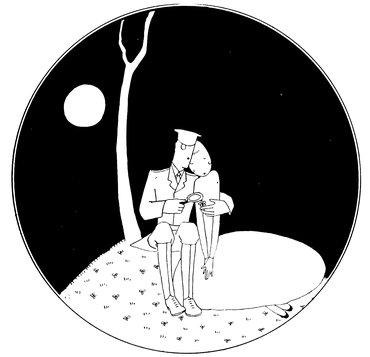
—for as you see, it is only a lesson in botany
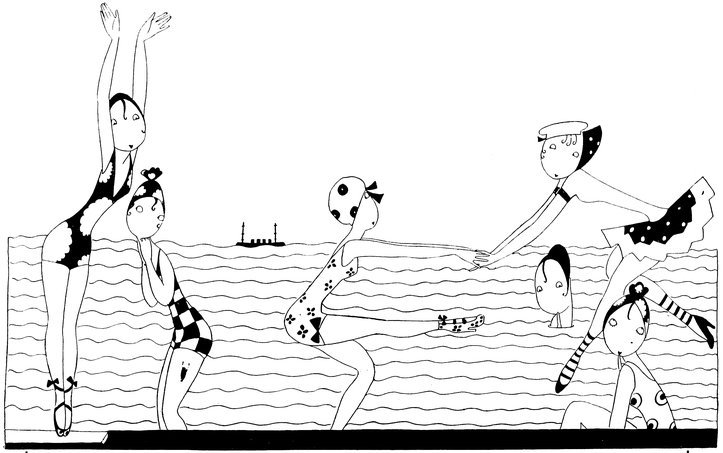
Even Eve’s desperate attempts to simulate a gaiety which she does not feel do not blind one entirely to the tragedy of the Adamless condition of our bathing beaches
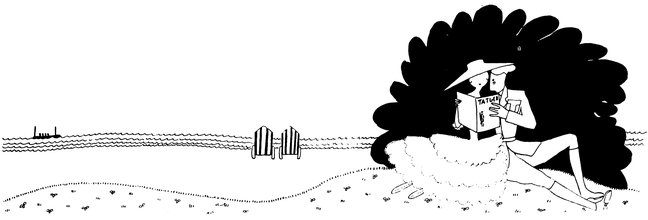
At certain fashionable resorts on the east coast Eve and Adam discover the rapturous solitude they seek for, which they find absolutely denied them— — —
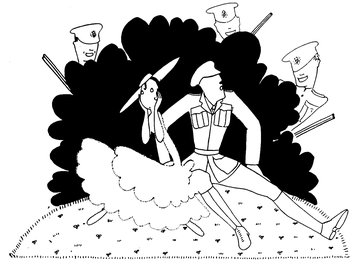
—in erstwhile rural paradises, owing to the activities of the new armies and the last gaspers
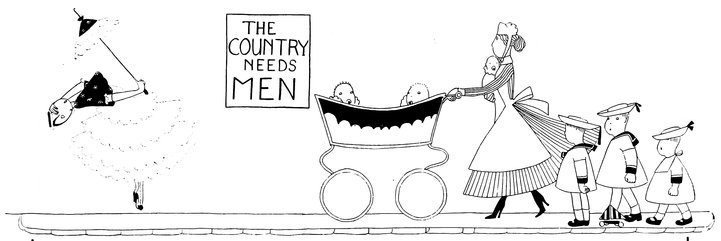
A tragic and dramatic picture, showing Eve overcome with the sudden and true realisation of “where duty calls”
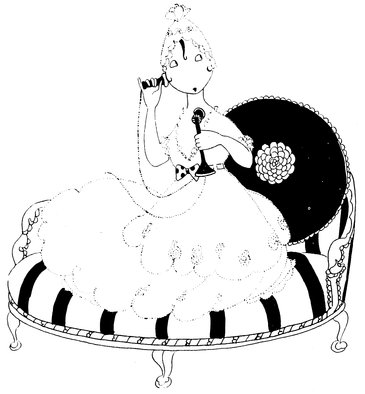
Eve receives a telephone message from Adam to say that he will be kept late at the office. Since Eve started her new economical cooking she has received similar messages about twice a week. So, telling the cook to keep Adam’s dinner warm for him—
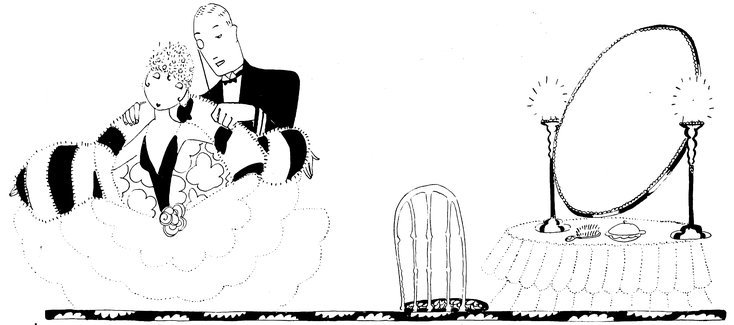
—she effects a further economy by going out to dinner with a pal
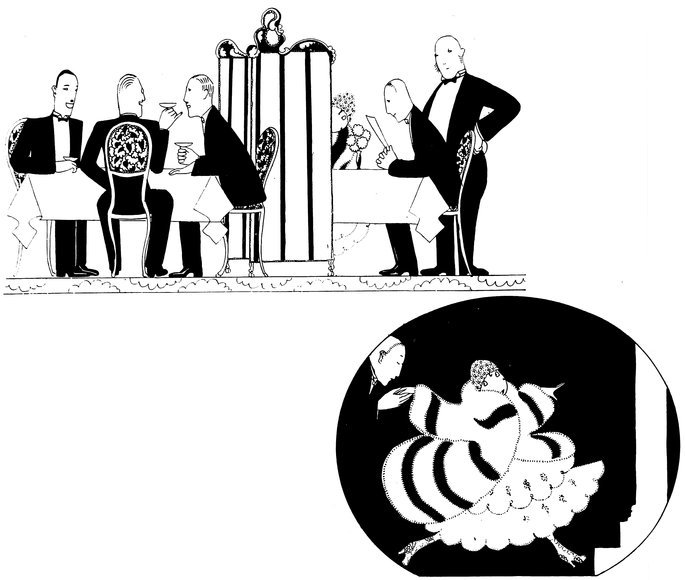
Imagine Eve’s astonishment to see, when she arrives at the restaurant, Adam wallowing in a scrumptious dinner with some of his men friends. Eve sees but manages not to be seen, and at an early hour she slips away and rushes home, where she awaits the elusive Adam—
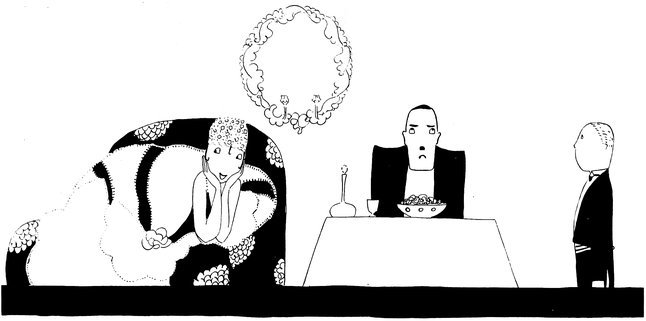
—whom she greets with tender solicitude, and insists on his sitting right down and devouring all that nice macaroni that cook has kept hot for him. Serve him right, the brute!
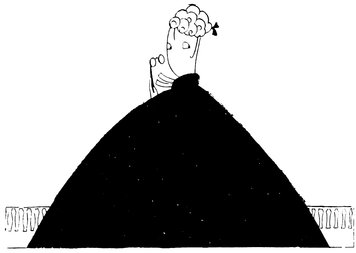
Eve, being of opinion that the interning question is not carried nearly far enough, decides to complete the operation by removing a lot of people who are better away. Here we have her robed and ready to hold her court of inquiry
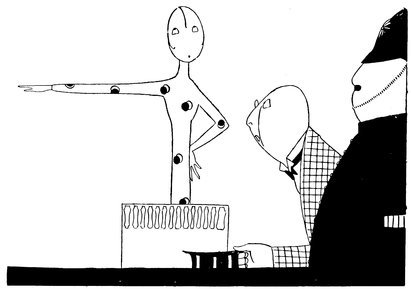
Uncle Fred is the first victim. He has been insufferable since he fell down the cellar steps avoiding the Zeppelins, and made his bandaged and unjustifiably heroic reappearance since the accident
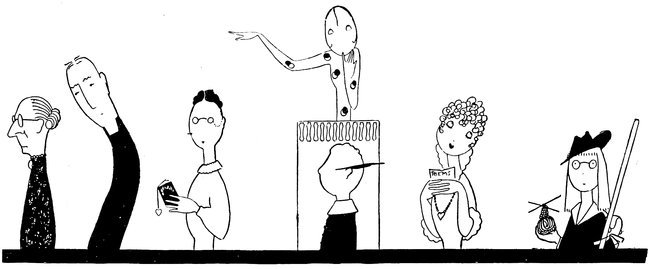
Next to be sent into an unhonoured obscurity are, reading from left to right—(1) The lady who advocates the equality of the sexes, with a suppressed predisposition towards emotional freedom; (2) The curate who has heard an early cuckoo and looses the news on a receptive press; (3) The lady with an insatiable desire to communicate with a “lonely soldier”; (4) The little boy who will recite; (5) The poetess whose spring ebullitions fill the corners of the papers; (6) The little girl scout who desires to blend patriotism with publicity—on her knitting activities
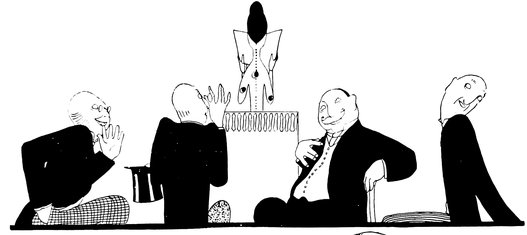
Next come, or rather go, those senile saunterers or withered nuts who turn round for a leering examination of the little Eves who pass them on their doddering promenades
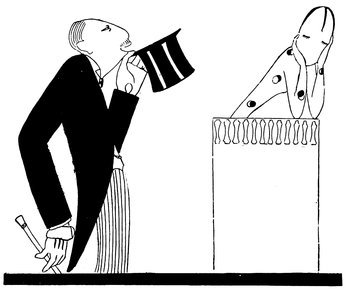
The young man who has Cook-toured the Dardanelles in the past, and who on the strength of it insists on explaining at great length the operations there, is sentenced to be sent back at once, to be used as a sand bag or a buzzer
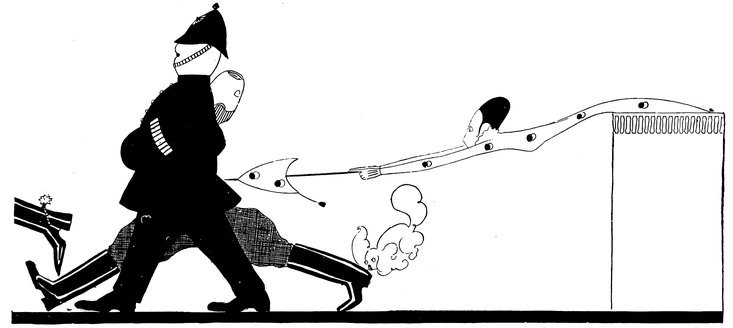
And last but not least, the gentlemen who invented the wide skirt are sentenced to be smothered in their own creations. We regret that Eve’s feelings should, after administering justice, have induced her to administer a most unjudicial poke with her parasol in the rear flank of the destroyer of her peace. Tou-Tou is also seen advancing to the attack
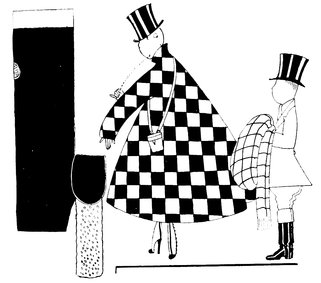
Eve, momentarily weary of well-doing, goes for a holiday and a day’s racing
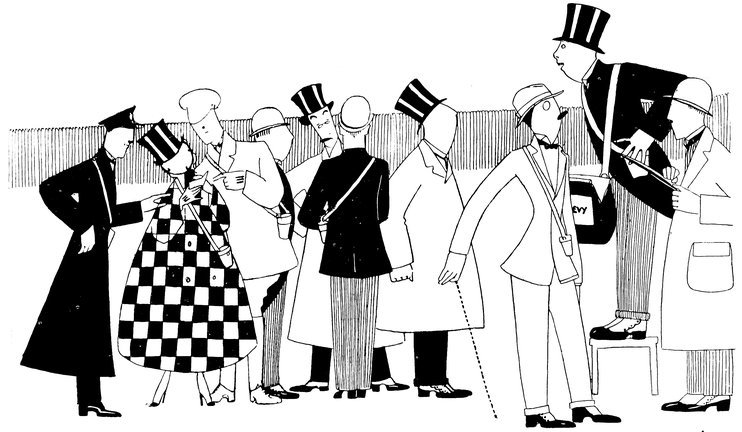
On every hand, with that air of mystery so necessary to all real racing “heads,” her admirers urge her to back Mr. Jolly Soel’s horse, which she is proceeding to do. When—
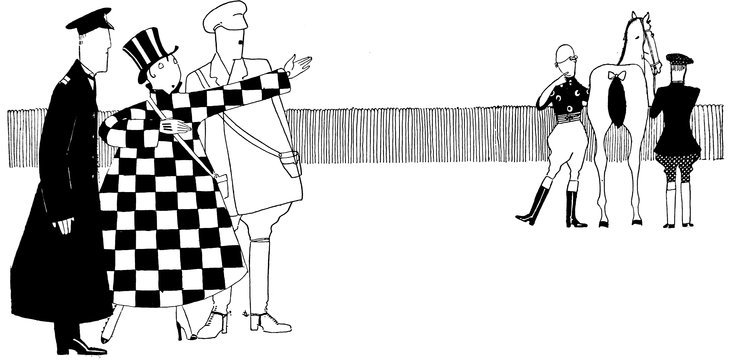
—she catches sight of a jockey whose looks attract her, and whose colours satisfy her artistic sense. Naturally she puts “her shirt” (as Adam so vulgarly expressed it) on his mount
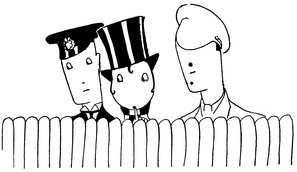
Her attendant Adams scoff at her foolishness, and Eve has many anxious moments as the race proceeds—
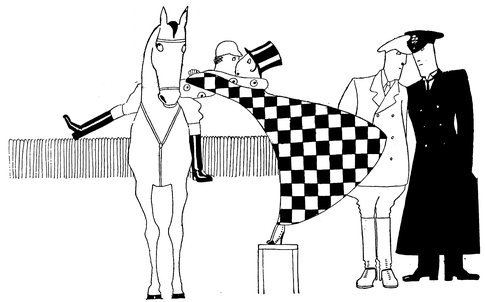
—but, of course, Eve’s charger rolls home first, and her feelings overcome her to such an extent that she embraces the attractive jockey in the open. (We regret that the horse, which is on the left of the picture, has only two legs. Eve refuses to draw any more for the money)
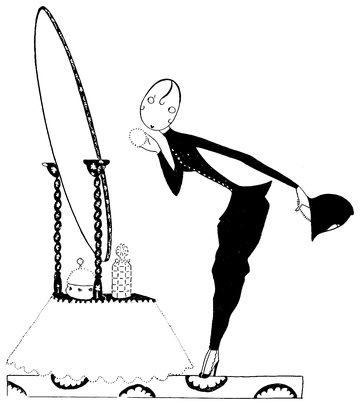
With the idea of releasing an able-bodied “bobby” for action, Eve determines to join the women’s police, and is seen preparing herself for her day’s beauty—or rather duty
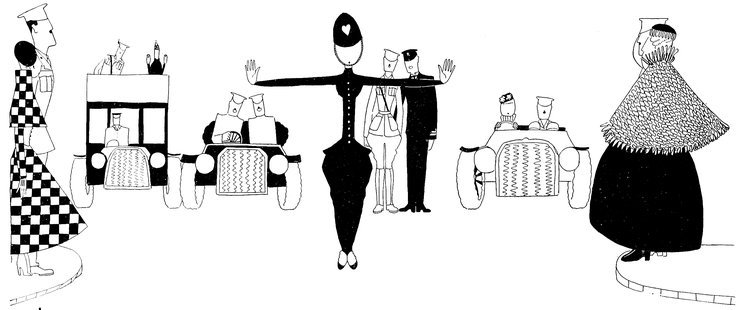
She found there was no difficulty in stopping the male traffic, although jealous and inefficient females evinced a desire to “pass along”—with their snub-noses in the air. Everything was going beautifully until—
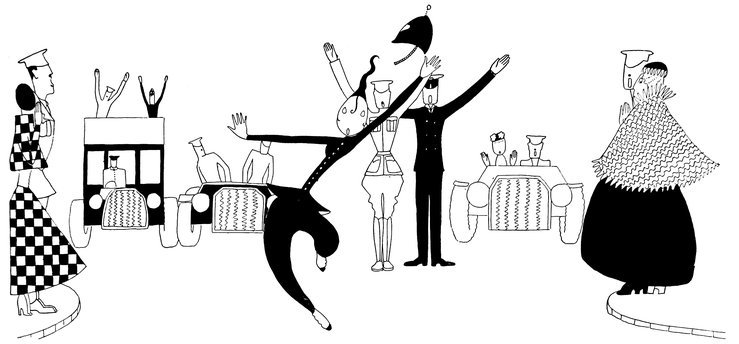
—a gust of wind seriously disturbed the equanimity of our little policewoman in the manner above pictorially described. It ended in stopping the traffic for miles round—
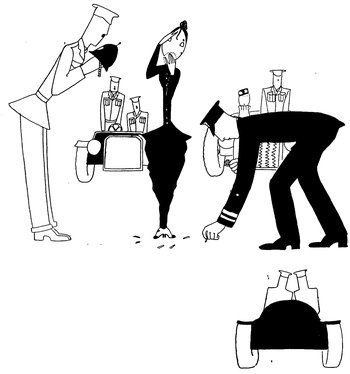
—as, of course, her damaged coiffure had to be rearranged, amid sarcastic comments from the females “afore mentioned”—
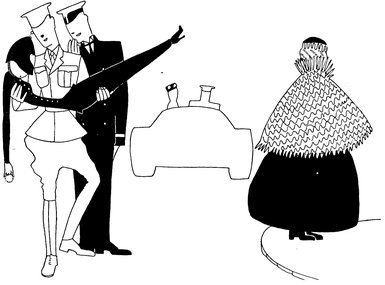
—which for once thoroughly upset our tired little heroine, who was herself “taken up” dead beat and conveyed home by gallant members of the sister services
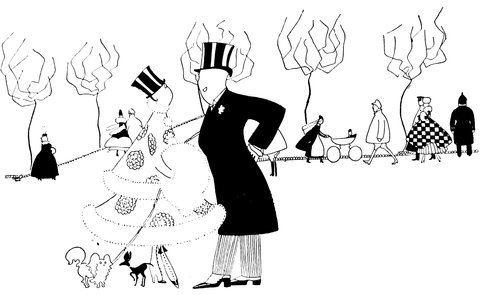
Eve has a magnificent idea for helping on the war. Meeting Uncle Fred in the park, she wheedles him into escorting her into the Saveloy Hotel—
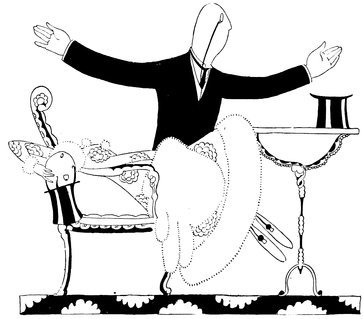
—where she is overcome with a sudden faintness, which disappears as soon as the perturbed uncle has given her a liqueur brandy. With commendable patriotism she has him arrested on the spot for treating, and
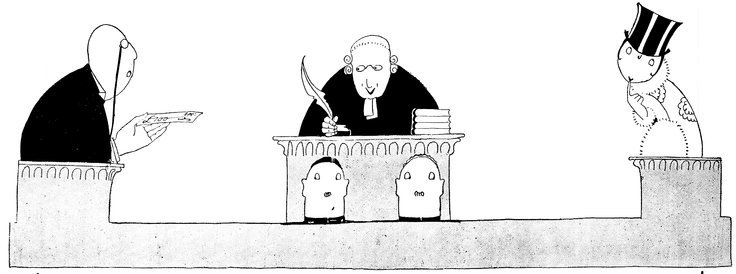
—the result is a considerable contribution to the funds available for the prosecution of the war
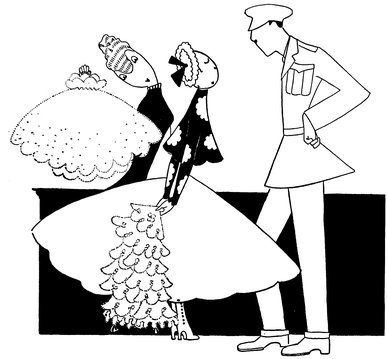
Eve would very much like to know why one meets such numbers of young soldiers in the “frillies” department at the various stores. To meet one’s fiancé in the midst of trousseau preparations is, to say the least of it, awkward
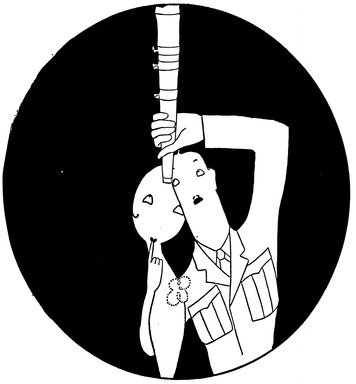
The fact that the air raid on London, if coming, cannot be much longer postponed, combined with the warm and darkening summer evenings, has rendered the game of Zep-watching more popular than ever. Many gallant soldiers are daily “bombed” into matrimony in consequence
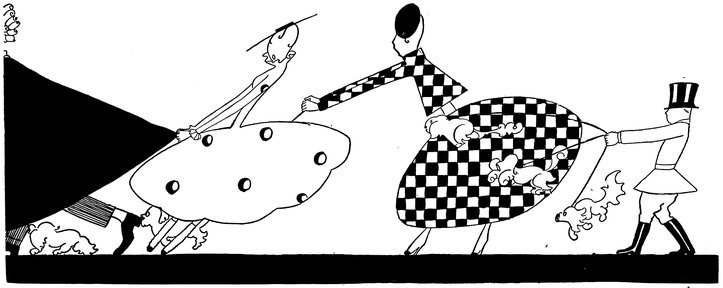
This is a battle picture, and shows a massed attack by Eves and attendant Tou-Tous on Mr. Justice “Blank,” who dared to criticise the race of Pekingese in court during a recent case
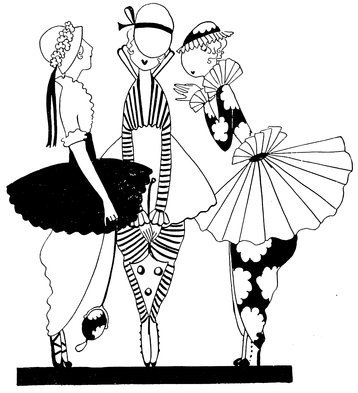
Reminiscences of gay, glad years that are past flicker through Eve’s frivolous mind. She remembers the picturesqueness which ever graced the appearance of Eve, Evelyn, and Evelinda—
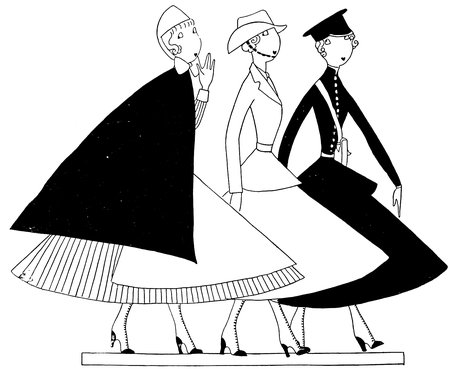
—contrasted with the stern utility of the costumes she now wears. However, as Eve says, contrast is the salt of life and—
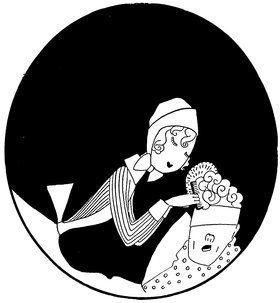
—after a day’s hard nursing—
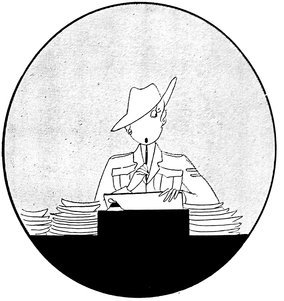
—or filing of war-baby records—
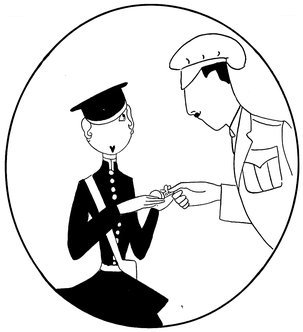
—or collecting tickets—

—she finds that she enjoys a little amusement in the evenings more than ever she did
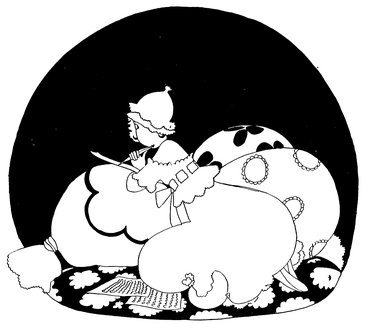
Eve—in her loneliness—has adopted a lonely soldier, and writes faithfully to him every evening
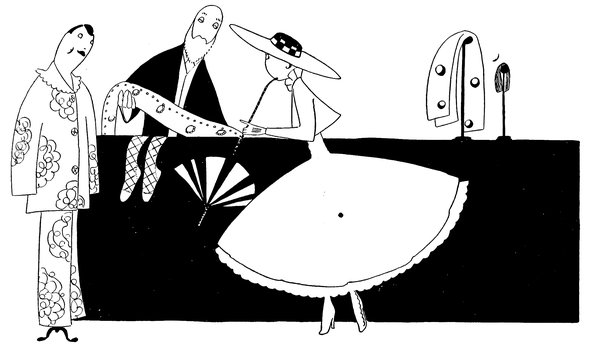
Wishing to make life pleasanter for him she orders for him many articles of male attire and other comforting trifles
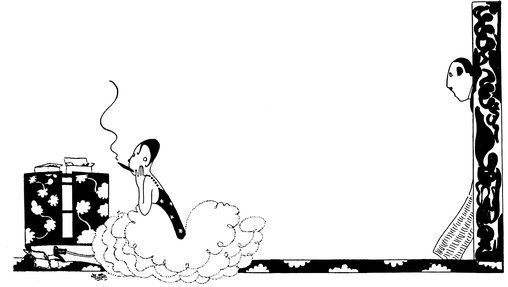
Eve, finding that the testing of cigars for the lonely one is a somewhat unpleasant business, causes a certain amount of friction with Adam by sending him the ones she knows that Adam keeps for himself and his particular friends
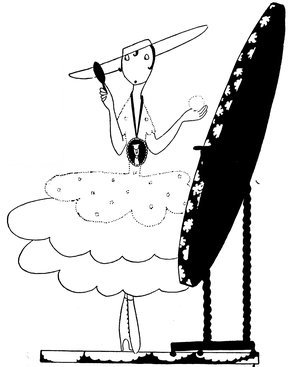
When the lonely soldier comes home Eve goes forth to meet him in her very best with his photograph dangling gracefully round her neck for identification purposes
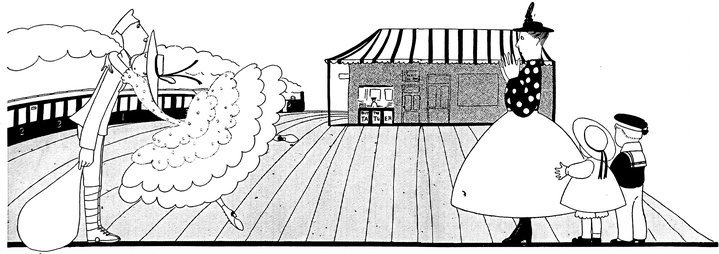
At the station (it is a station) Eve meets her lonely friend, but finds to her astonishment, when she warmly greets him, he does not return it with any enthusiasm. Turning round she sees to her horror—not unmixed with fear—that his wife, whom she hadn’t heard anything about, has also arrived on the scene
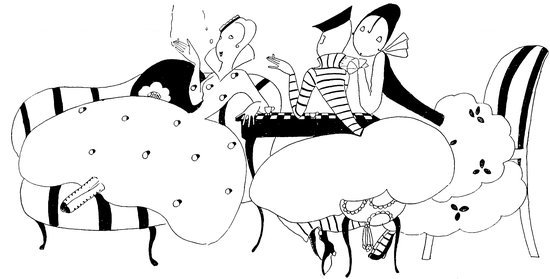
Eve, Evelyn, and Evelinda find they simply must do something to pay for the rise in hats consequent on these horrid war taxes—
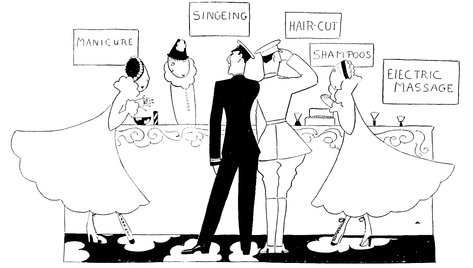
—so, with a view to keeping some of the new officers up to old form, they start a beauty barber’s shop for the blue and khaki—
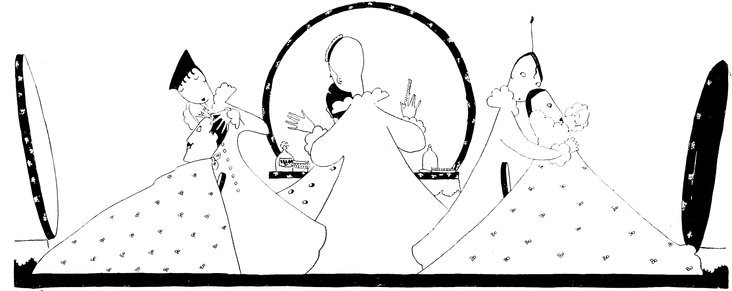
—which is an immense success from the day of opening. Isn’t Adam on the right getting a dinky frothing?

Manicuring is simply a screaming success. Two operators are compulsory. For Eve cannot trust Evelyn or Evelinda, and neither of them can trust Eve alone in the dim recesses of that department
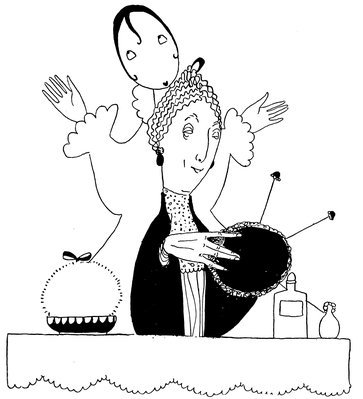
But success brings as usual trials in its train, and now Aunt Martha insists on having her hair curled there daily—
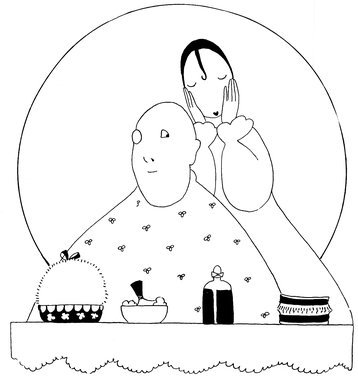
—while Uncle Fred is a very glutton for having his hair cut
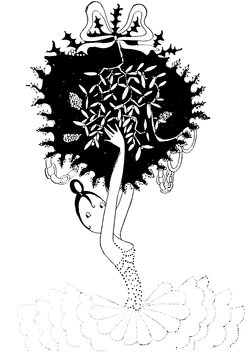
(1) Eve goes down to Aunt Matilda for Christmas. Her first care is to hang up a bunch of mistletoe in a prominent position—
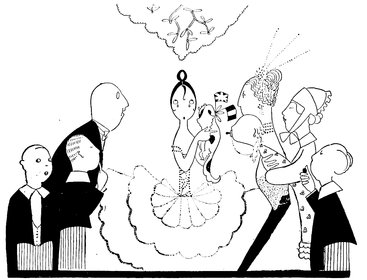
(2)—which she steadfastly stands under. Alas! naughty old men and schoolboys are the only representatives of the male species present to take advantage of it
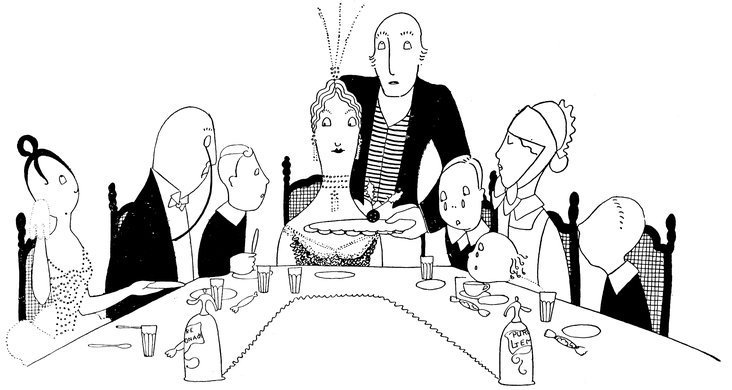
(3) The Christmas dinner is still more depressing—no Adams, no excitement. (Note the size of the war plum pudding and the character of the drinks)
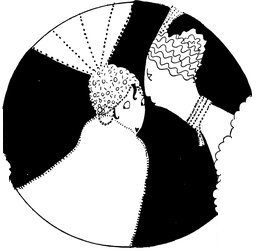
(4) So Eve says she has had a wire and the next day bids farewell to a stern and incredulous aunt
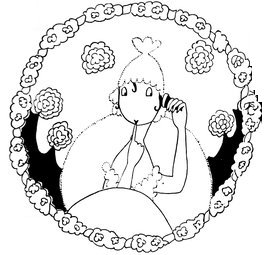
(5) Back in town again, and the dear boys ring up and insist on Eve coming to the Savoy for Boxing Day dinner

(6) Here are the dear boys in khaki and blue telephoning. The names, from right to left, are (censored by Eve)
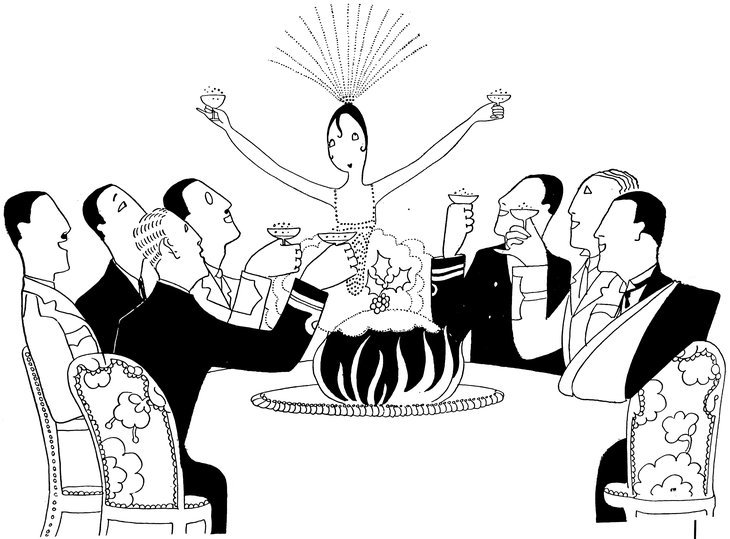
(7) And finally here is our little friend, her spirits regained and surrounded by her gallant friends in khaki and blue, to whom, on behalf of herself and all her dear friend readers, she is wishing God-speed, good luck, and a happy and victorious return
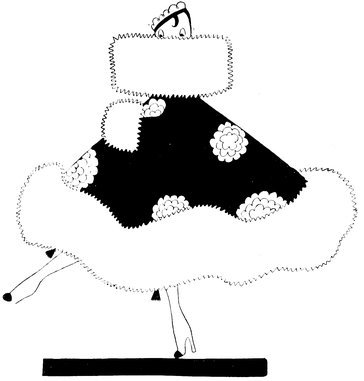
Eve is a great admirer of the new voluminous high-collared fur cloak, but finds it impossible to see—much less appreciate—the dinky tassels on her new boots
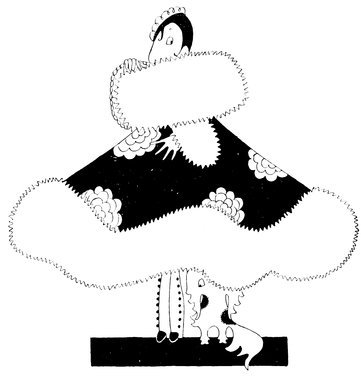
She also finds her friends have the greatest difficulty in recognising her, and that Tou-Tou is continually getting lost
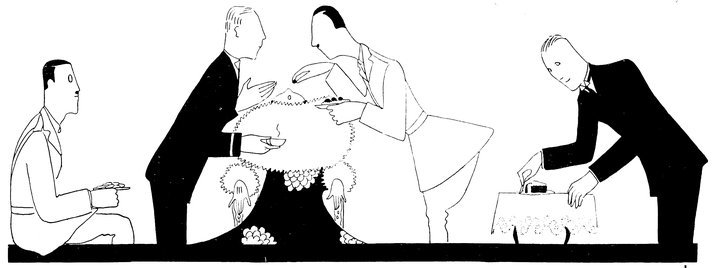
Furthermore, these high collars make it necessary for Jack and Tommy to feed her when she goes to tea with them at the Savoy. (Doesn’t it make a pathetic and appealing picture?)
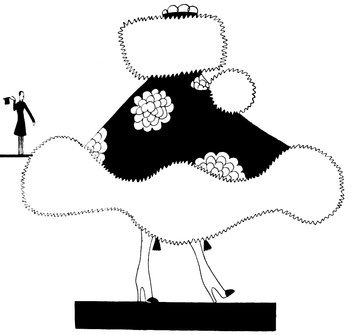
One advantage, however, is that when Johnny Slacker, Mr. Bore, or anyone horrid heaves in sight she can retire without danger of recognition
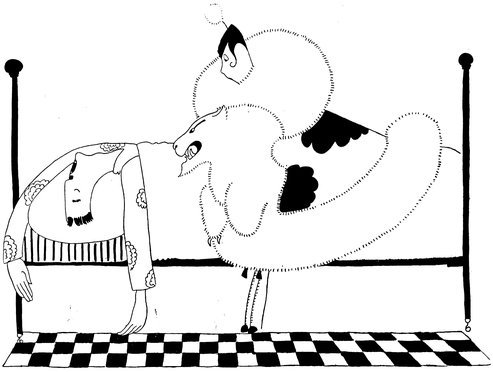
Eve adores the ferocious masks which adorned the muffs of the truly fashionable last winter. But the above tragic incident, which shows a convalescent V.C. fainting in sheer terror at the sudden appearance of our heroine—and muff—has considerably shaken her pleasure in her hand warmer

Eve is “simply mad” over the way Gertie Millar does her hair in the Gollywog song at the Palace Theatre. She tried it, went to the theatre, and found herself the centre of interest from all sides and abuse from the back
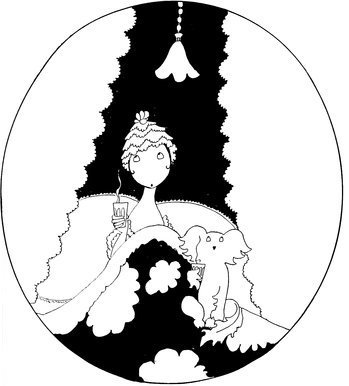
The tax on tea and sugar has reduced our poor Eve and Tou-Tou to hot water instead of the refreshing cup of tea which formerly cheered Eve’s early-morning awakening.
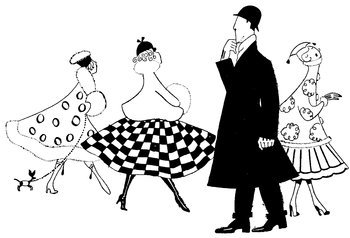
Why it is that when Adam has got his oldest clothes on, and has neglected to shave the bristles from his clear-cut chin, he always meets his most adorable acquaintances—Miss Wild-Duck, Miss Flirt, and Mrs. Darling—
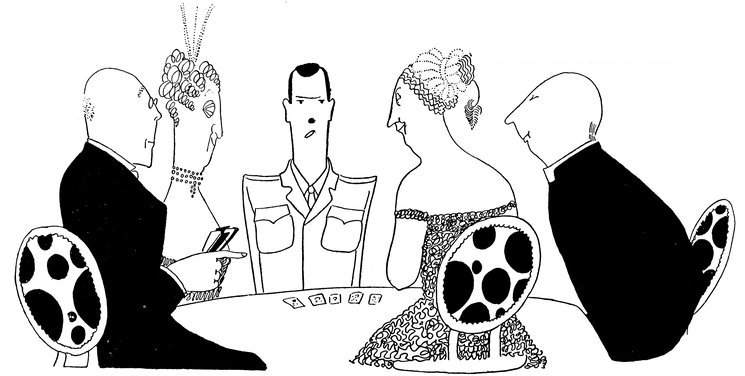
—Whereas, when he goes out to dine, très bien soigné in his brand-new uniform—red tabs an’ all—this is the sort of party that greets his wrathful gaze? (At the particular moment the picture was taken Aunt Matilda’s second revoke was passing unnoticed in the pleasant hum of conversation)
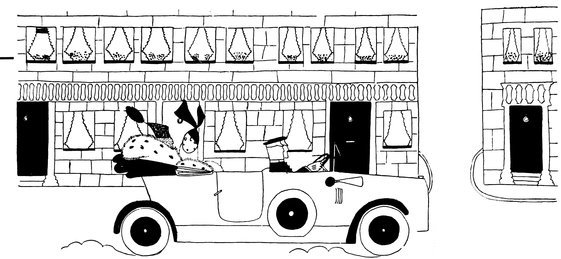
Why, also, that on the rare occasions when Eve’s oft-quoted but distant cousin, the Countess of Crimp, takes her out for a drive, the streets are empty of envious friends or impressed tradesmen—
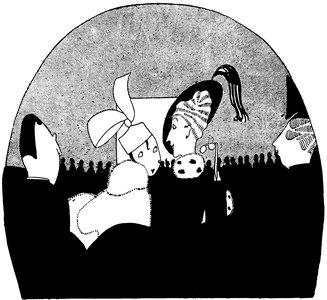
—And that the dear Duchess of Bohemia insists on spending the whole of their mutual time in the obscurity of a “movie” theatre—
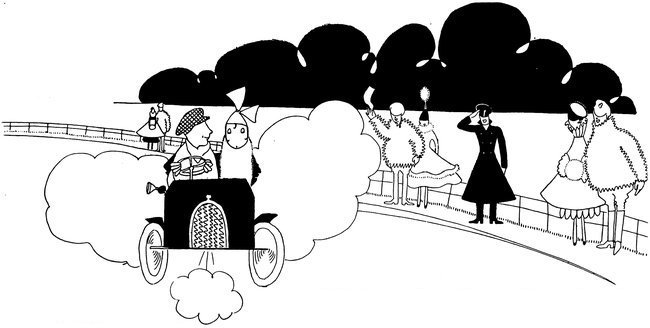
—Whereas when Cousin Tom from the country, with absolute sartorial indifference to the conventions of London, induces her to drive out in his second-hand Ford, Eve meets and sees everyone she has been trying to impress favourably for seasons past?
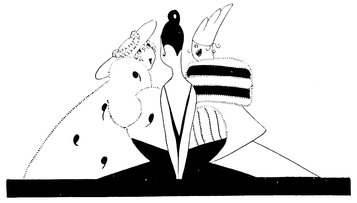
This is Eve congratulating her two dear friends—Miss Verry-Pretty and Miss Plain—on their engagements. She is expressing the usual frantic anxiety to meet the happy fiancés
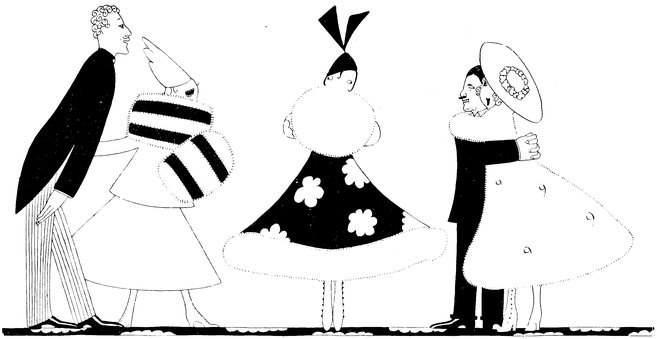
She meets them, and wonders again for the nth time why it is that the pretty girls are nearly always captured by the—well—ordinary-looking men, while those less favoured by Nature so often bag veritable Adonises
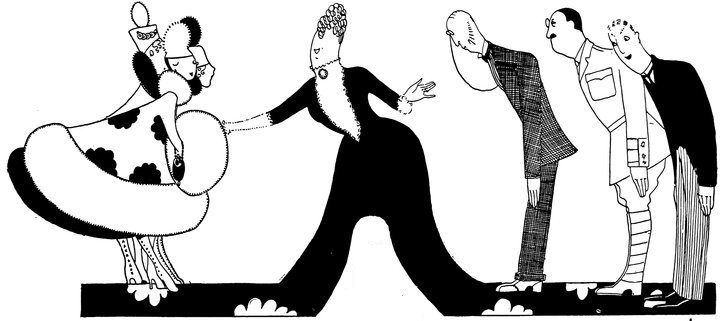
Eve, burdened with the responsibilities of her unmarried sisters, Evelyn and Evelinda, is always endeavouring to get them suitably paired. She finds it very annoying that when she takes them out to dine with her very highly respectable cousin, the Countess of Crimp, they meet so many people like Mr. Snob, Captain Auction-Bridge, and Mr. Toady
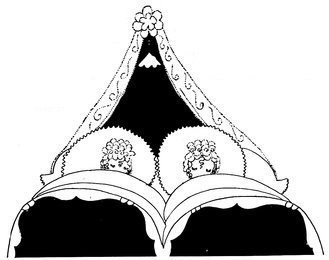
Whereas when she has tucked her little charges safely away in bed and flies out for a little relaxation to a naughty night club—
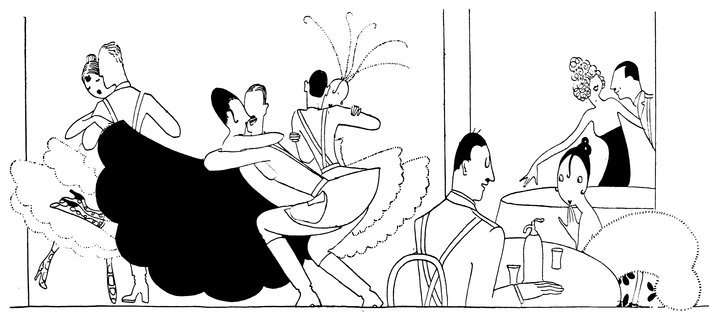
—She meets Lord Knut, Reggie Hardcash, and all those very gilded and eligible young men who would lead Evelyn and Evelinda to the altar in so suitable—and golden—a fashion
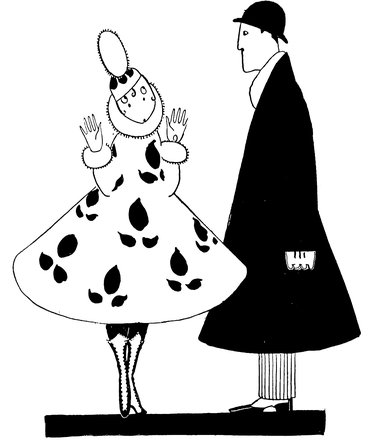
Adam insists on Eve being revaccinated. Eve retorts that it can’t be done while the fashions prevent you having any sleeves in your evening dresses. Adam replies, “Have it done on the leg, then!” But Eve, more in sorrow than in anger, is saying, “How can I show my legs to a doctor man!”
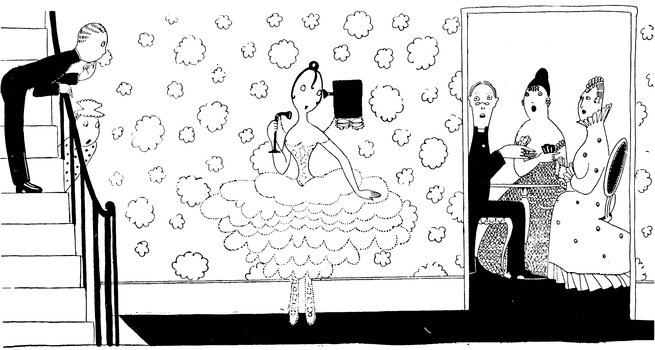
Why is it so many people’s telephones are in the hall or some equally public place? This is what Eve feels like when Captain Perfect Spooner rings her up at a friend’s house
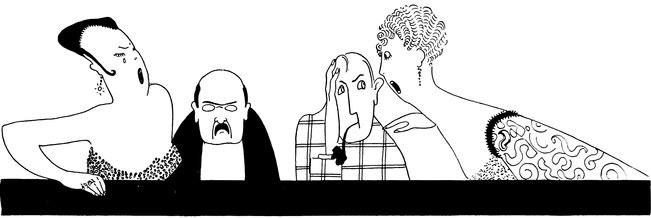
Why is it when most married men are simply dying to be “called” anywhere—
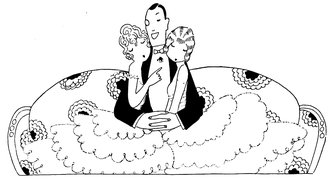
—A short-sighted Government has called up all the single men who are so badly needed at home and enjoy life so unmistakably?
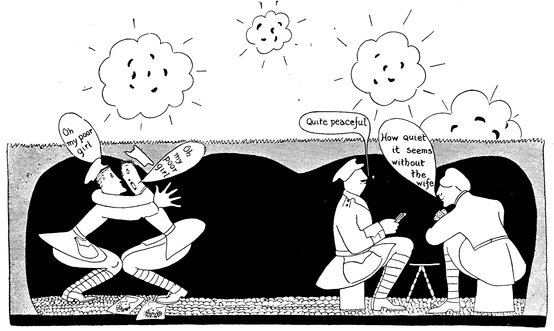
This is how trench life appeals to them respectively. The married men are on the right. (We must explain that the bachelor warriors on the left are not petrified with terror, but only agitated in thinking of the dear girls they left behind)
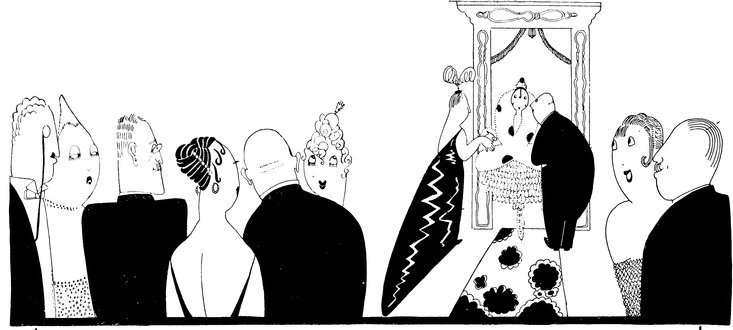
This is one of Eve’s great moments in the day—namely, arriving last at a big dinner party. She knows full well the effect of this tardy coming—this bursting upon a collection of delighted if hungry men and curious and envious women—instead of trickling in with the others at the proper time
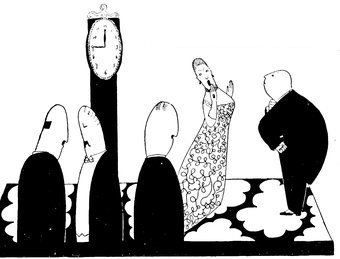
But the above manœuvre is a very catching habit, and each little Eve, anxious not to be the first to arrive, delays the hour of dining. Here we see a vivid picture of a hostess and her male guests sharing the knowledge that the soup is cold and the dinner going to blazes
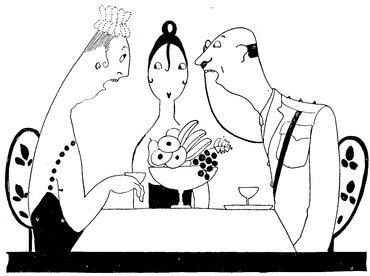
Eve has suffered overmuch lately from Aunt Matilda and Major Bore, so in a spirit of devilish revenge she brings them together in a little party à trois and tells each of them that the other is very deaf. The consequence was that they screamed away at each other until their tiresome voices were stilled for an appreciable period
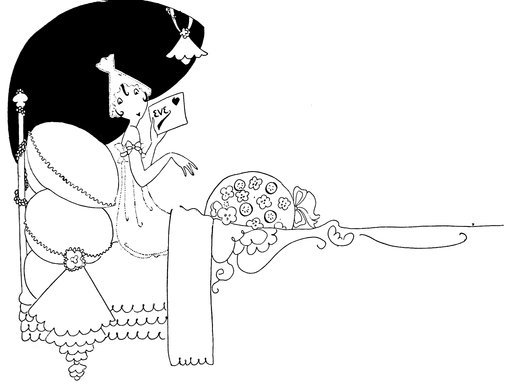
Eve receives an invitation from a unit of that most attractive and gallant body of men, the Royal Flying Corps. She is intensely excited and rushes off to see them
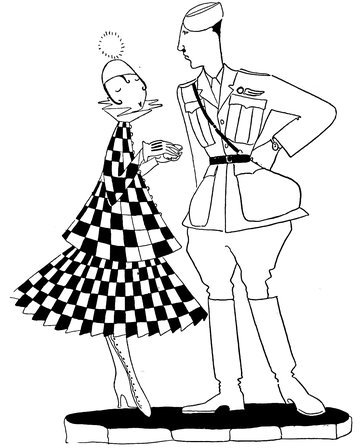
She finds that the “feeling” between woman and woman is nothing compared with that existing between members of the two sections of flying men. In the picture the gallant observer is saying, “What! Lunching with a beastly pilot? We always look upon ’em as mere chauffeurs, Eve, dear”—
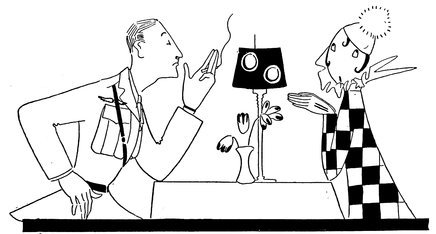
—Whereas, the intrepid pilot at luncheon remarked, “I shouldn’t get too thick with those observer fellers, Eve; we only regard ’em as bally luggage.” (Eve had to put the wings on the wrong side of the chest to show them)
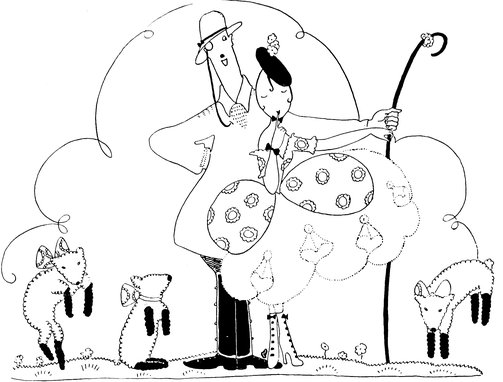
Eve, tired of the tension of war anxiety in town, determines to join the army of farmworkers. She and Adam therefore journey to Mudshire and offer their services to Farmer Giles. He suggests that they should commence by looking after the lambs, which pleased Eve immensely, as it meant a journey to town to procure a ducky little Watteau shepherdess gown. The lambs were hardly less affected than Farmer Giles.
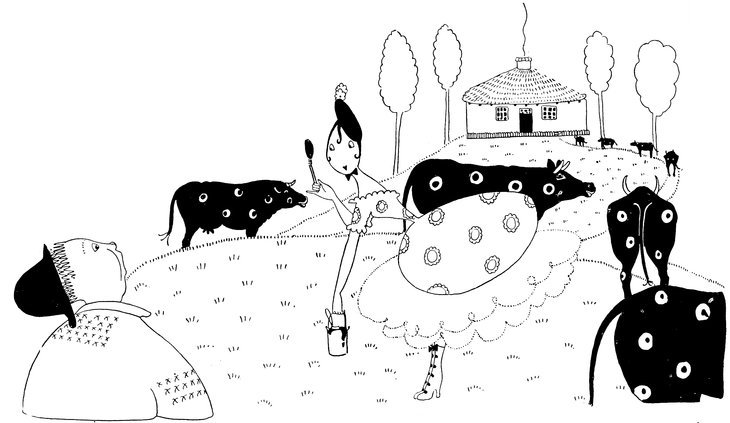
Eve’s artistic sense is deeply offended by the bizarre, not to say early-Victorian, markings of the cows; however, a judicious application of paints transformed them into ornamental as well as useful members of the community. Farmer Giles’s hair is, you will observe, rising in horror and pushing his hat of his head. (Eve can’t draw cows’ legs; hasn’t she got out of it cleverly?)
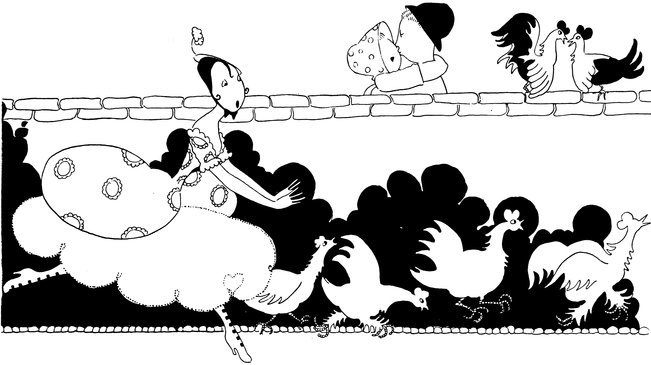
After experimenting in pretty but amorous poultry Eve is here seen ruthlessly banishing them from her rural Paradise; for, as she truly says, “they set such a bad example to the servants”
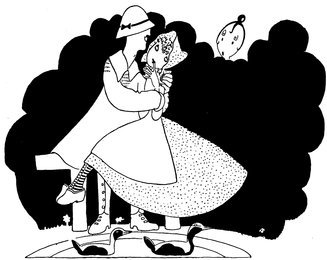
Adam decided to attend to the little ducks. He does so, and Eve prudently decides to—
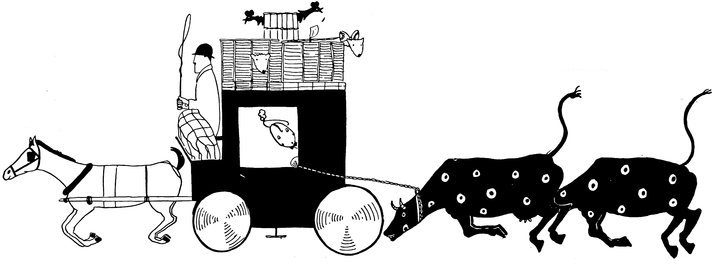
—Abandon Farmer Giles at once, and she returns with a chastened and apologetic Adam to London. The animals in the picture are those which Eve made pets of at the farm, and which she simply couldn’t bear to part with. So she is taking the poor darlings with her
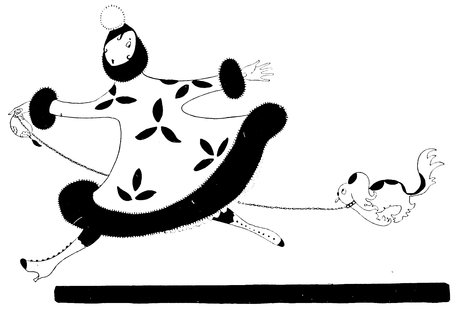
Eve, like Byron, wakes up one morning to find herself famous, as the Adelphi Theatre has made a screaming success over an “Eve” number. Here she is, with an equally excited and palpitating Tou-Tou, dashing to the theatre to book seats
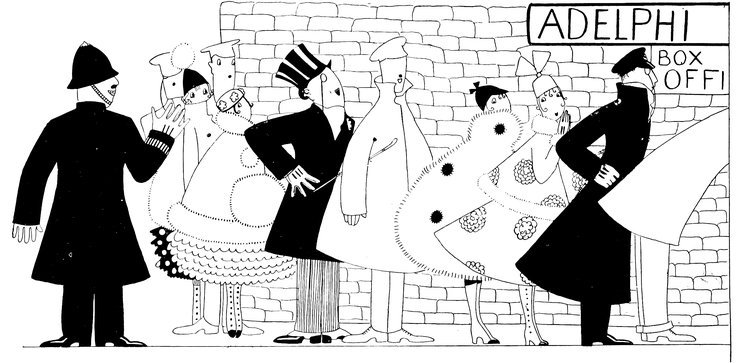
This is the ’orrible press outside the box office, which is besieged by khaki and blue—who do the most of the pressin’—Miss Wild-Duck, Miss Darling, and all the little Eves who appeared in the spring like the snowdrops
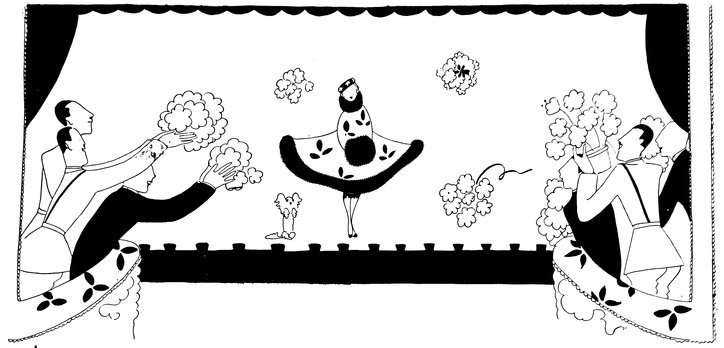
Here is dear Phyllis Dare singing the song, also Tou-Tou, who made straight for the stage when the play commenced, and some gallant heroes, who see their old but elusive friend materialised at last
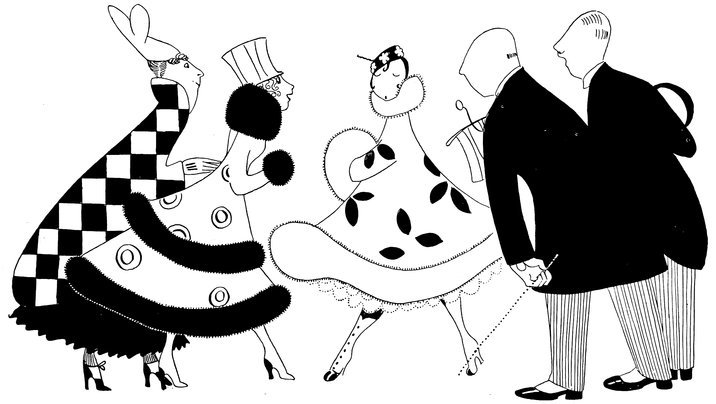
All this theatrical publicity has caused Eve’s head to swell right out of her collar. In the first glow of fame she feels she can treat Aunt Matilda, Miss Gush, and the Bore brothers with the indifference she has so long suppressed
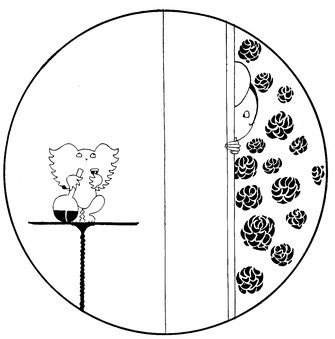
Now this is the terrible tragedy of Tou-Tou—Eve discovereth him imbibing of strong liquors—and in war time too
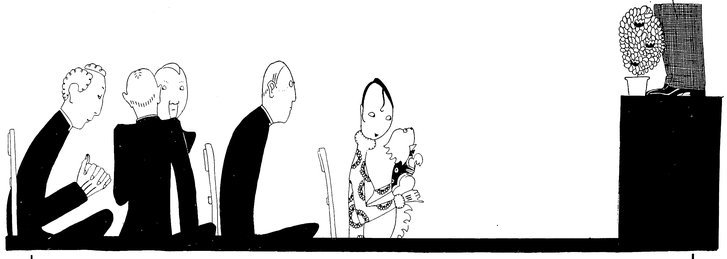
So she took the delinquent to hear Sir Edward Clarke’s grave lecture wherein he urged the clergy to set an example to the country by giving up all intoxicants. Tou-Tou’s disgust is evident. Owing to lack of space we have only room to show Sir Edward’s impressive legs
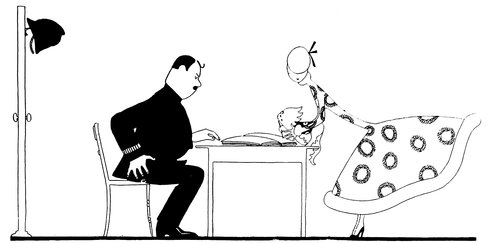
Overcome by Sir Edward’s eloquence, Eve takes Tou-Tou to the police station to sign the pledge
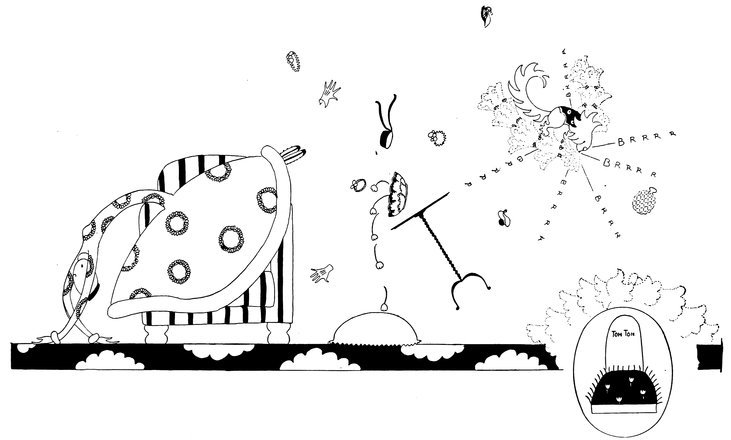
Tou-Tou, accustomed to sly sips of port, stands the monotony of life for some time, but suddenly breaks out and enters on a career of “frightfulness,” which, as is seen in the picture, thoroughly upsets his mistress. The sad result of this outburst is seen in the right-hand corner of our page.
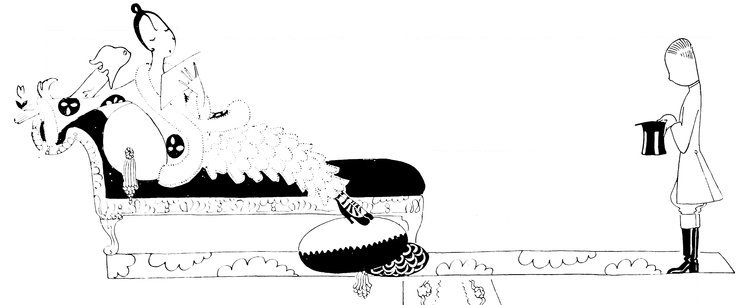
A number of tiny dances were given this springtime for the sake of the dear boys on leave. Hundreds of years ago, before the war, Eve used to get her dance invitations in this way on formal and ceremonial cards. But nowadays they are conveyed in much happier fashion; for instance—
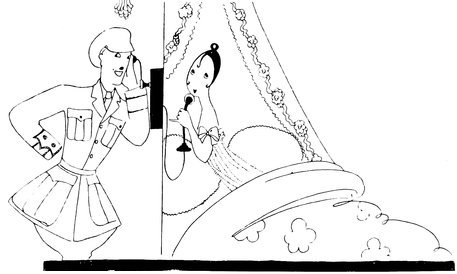
—Reggie (on leave): “Hello! Hello, Eve! Just back, old girl, and a few of us want to strafe some bubbly tonight, so we’ve borrowed a house, and we’re givin’ a hop. Roll up with a few ‘cheeries,’ and bring a bottle with you in case the supply dries up”
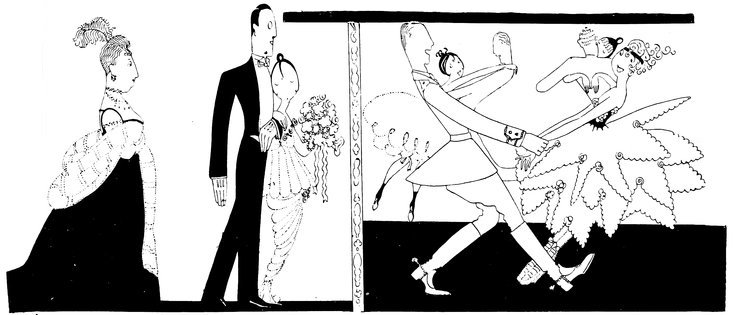
The classical picture on the left represents the pre-war Adam taking a demure Eve away from her watchdog for a graceful waltz. On the right you see the modern, cheerful, and unchaperoned conditions. (The Adams and Reggies don’t really dance in uniforms and spurs, but Eve likes drawing them like that)
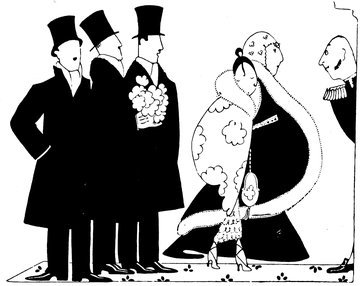
The arrival at “the ball” in the old days. Haughty wall-propping men, and little Eves wondering whether they were going to get off and detach one of the aforesaid males from his customary support, or also decorate the side benches—
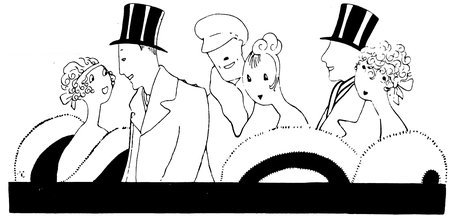
—But nowadays at “the party” each little Eve takes her own young man—sometimes two—with whom she spends the greater part of a delightful evening, so she’s happy, he’s happy, and chaperones, safely ensconced in bed or at the bridge table, are happy too—
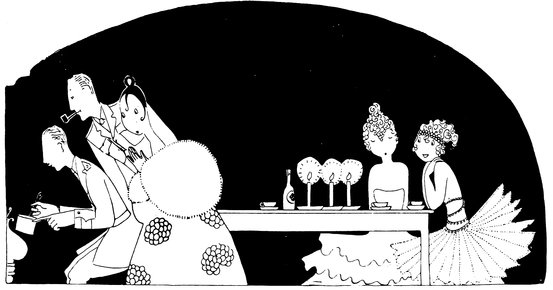
—While the final breakfast-supper, when a raid is made on the kitchen to see what can be found, and Reggie or Billy makes the most divine omelettes in the fish saucepan, provides a worthy finish to a delightful evening, which keeps many a festive on-leaver out of mischief
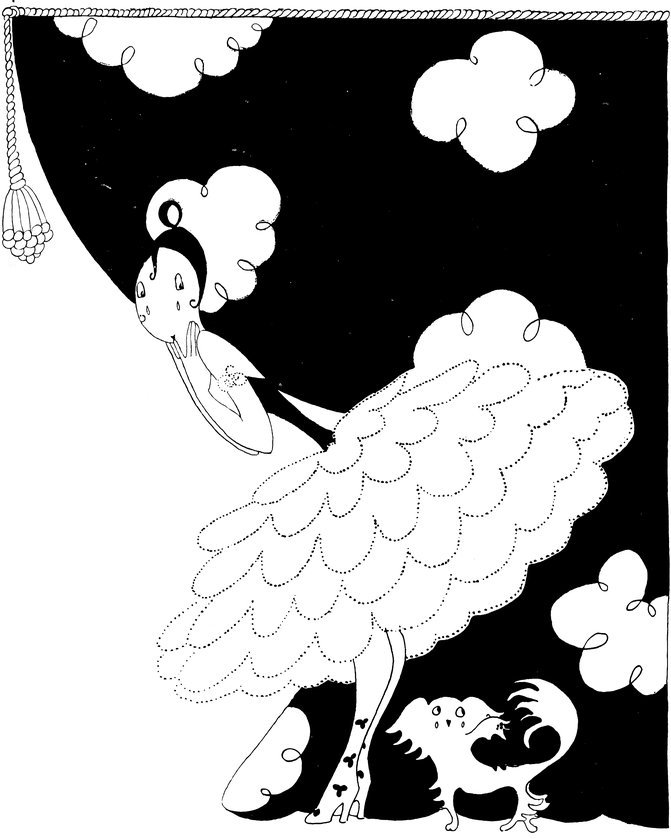


and then send it out to their Adam, whether he be in the North Sea or the Trenches.
is merry, jolly, and pretty—and heaven knows “the boys” get little enough of that side of life while doing their grim duty.
